Aug 29-Sept. 4, 2025
5 Elul 5785
Shoftim Vol. 24, No. 28
Reach the Star: Editor@TheJewishStar.com 516-622-7461 x291



Aug 29-Sept. 4, 2025
5 Elul 5785
Shoftim Vol. 24, No. 28
Reach the Star: Editor@TheJewishStar.com 516-622-7461 x291


By Ed Weintrob,
Last week’s Nefesh B’Nefesh flight — the group’s first ElAl charter since the Oct. 7 invasion — carried a diverse group of 225 olim.
Those returning home were tech workers and teachers, lone soldiers, physicians and other healthcare professionals, children and retirees, baalei teshuva and frum-from-birth, observant and traditional. They came from 10 states and one Canadian province.
One of those states is Iowa, the quintessential “flyover” state that is rarely stumbled upon in the game of Jewish geography.
Linda and William Bingham followed their son, a professor at the Technion in Haifa, who made aliyah on the last Nefesh charter flight before the war.
“He said, ‘come on, just do it’.”
For 15 years, the Binghams lived in Fairfield, a town of 9,500 in southeast Iowa that is an international center for Transcendental Meditation and home to Maharishi University. The town, which Linda said “might” have 300 Jews, is a 2-hour drive to the Maccabee’s Kosher Deli in Des Moines, the state capital. It’s not a hub of thriving yiddishkayt,
The journey that culminated in the Binghams’ moving to Haifa was complicated — at least a bit — by the fact that they were bringing along their four dogs, who traveled in cargo and were happily reunited at Ben Gurion airport.
“I have worked with Nefesh B’Nefesh on so many different issues, and every single time they handle the logistics,” said Linda Bingham. “What stood out was the way they made
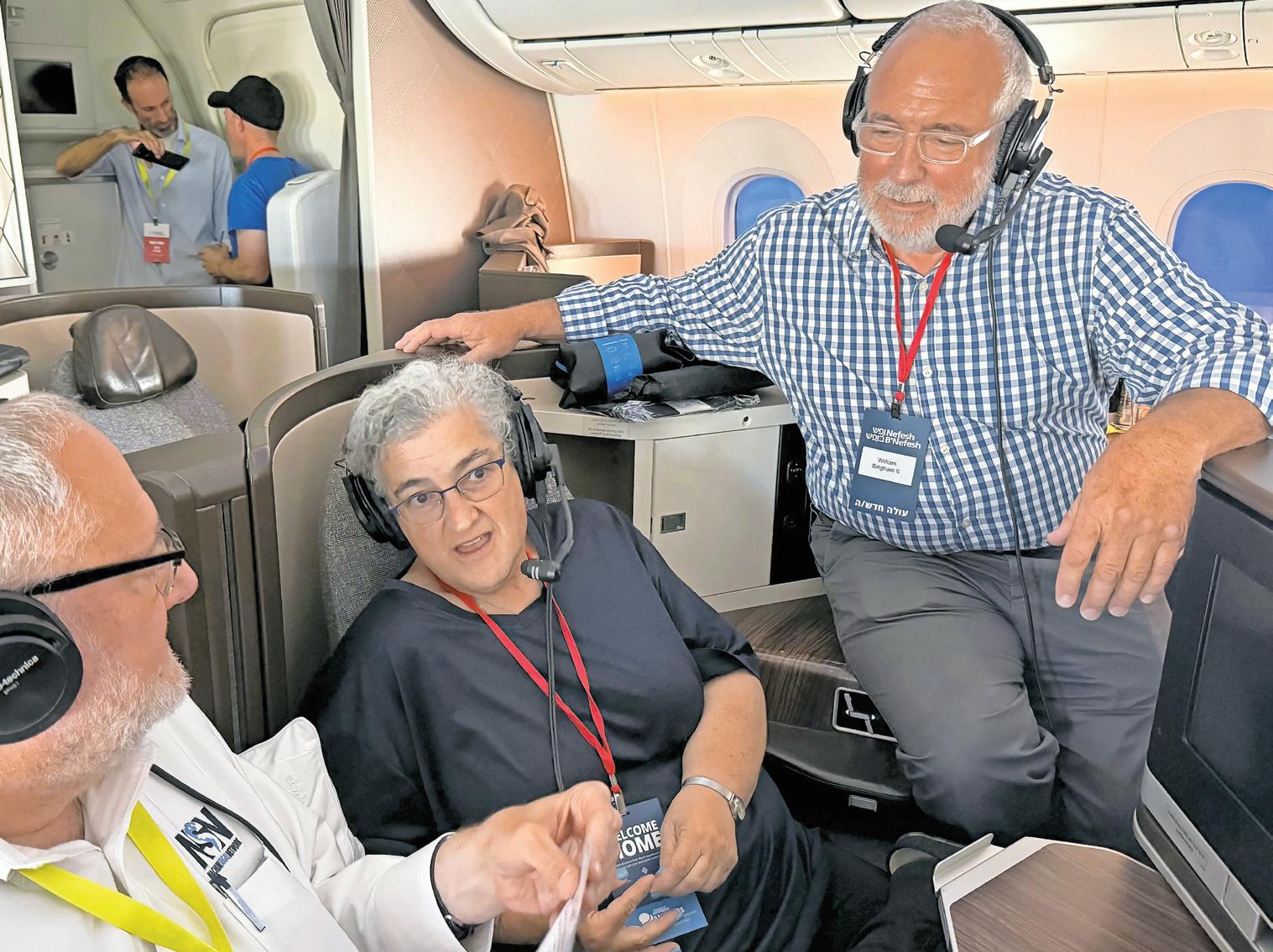
us feel welcome and comfortable.”
When they visited their son in Haifa during the war, “we never experienced a community where I felt so welcome and so safe and so

looked after, total strangers trying to help us.”
William Bingham, who has worked in information technology across industries and also taught, hopes to teach in Israel. Linda

said her dream job would be with Nefesh B’Nefesh helping new olim
The olim on last week’s flight join over 90,000 who have made aliyah with the assistance of Nefesh and its partners since its inception in 2002.
August was set to see more than 1,000 new immigrants arriving in Israel, the highest monthly total in over 20 years, Nefesh said. Since the events of Oct. 7, over 7,000 new immigrants from North America have made aliyah, underscoring an extraordinary commitment to the Zionist dream in the face of ongoing regional conflict, it added.
“These olim are fulfilling their dream of making Israel their home,” said Nefesh CoFounder and Chairman Tony Gelbart.
“People are not running away from anything,” he said, alluding to a well-document increase in antisemitism in the Diaspora. “They’re running to something, they’re running to Israel [where] they’re going to contribute right away, right when they hit the ground.”
That so many Jews are making aliyah while Israel is engaged in a protract war “is a strong message,” Ofir Soffer, Israel’s minister of aliyah and integration, told a reporter. “During a war people escape from a country. But Jewish people are coming to Israel.”
Nefesh emphasized that it would not be successful in all it does without its parter organizations — Israel’s Ministry of Aliyah and Integration, the Jewish Agency for Israel, Keren Kayemeth LeIsrael, and JNF-USA.
See more about Nefesh B’Nefesh on page 2.





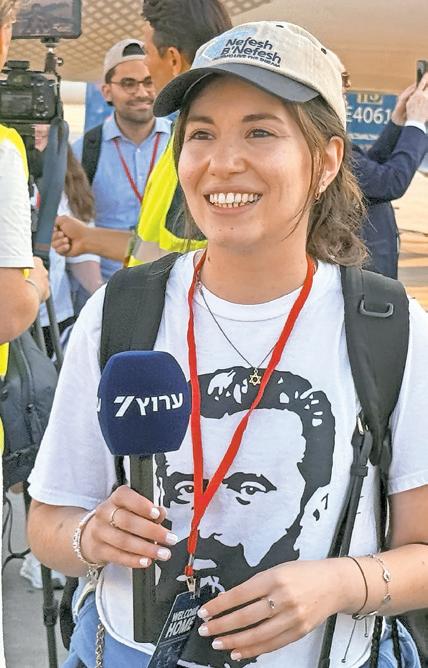
By Menachem Wecker, JNS
During a 70-minute conversation with journalists from Jewish media and a social media influencer in a conference room at Nefesh B’Nefesh’s high-tech headquarters in Jerusalem, the nonprofit’s leaders presented as Jack Lemmon and Walter Matthau (the characters Felix and Oscar in the long-running TV sitcom “The Odd Couple”).
Tony Gelbart, a businessman and chairman and co-founder of Nefesh, and co-founder and executive director Rabbi Yehoshua Fass, appeared to really enjoy each other’s company on Nefesh’s first charter flight since Oct. 7, which landed in Tel Aviv on Aug. 20.
At 30,000 feet, they laughed frequently at each other’s jokes and huddled to talk often. In the Nefesh conference room, where Gelbart wore a suit jacket and Fass was in shirtsleeves, rolled up, the two often finished each other’s sentences.
“We are not very good actors,” Fass said of his relationship with Gelbart.
Fass, whose ordination comes from Yeshiva University, where he also earned degrees in biology and education, was associate rabbi at the Boca Raton Synagogue in Florida, where Gelbart was a congregant.
“There’s a tremendous mutual respect between the two of us. There’s mutual love between the two of us,” Fass said. “We, for the last 23 years, have only missed speaking to each other on Shabbat or yuntif.”
“We talk at least once every day — about the organization, about Israel, about politics, just bouncing ideas that might not have anything to do with the organization, somehow it somehow gets back to the organization,” he said.
“We bring different talents to the table, and we know how we complement each other,” Fass said. “You can count on one hand, I think, when we really had moments of not tension, just disagreements. We usually see eye to eye.


We feel the same way.”
“This organization is definitely not about me or about Rabbi Fass,” Gelbart said. “The idea is to focus on the olim that are coming.”
Fass said that it’s important to focus on the “product,” though he was loath to use that word.
“The product comes before us,” he said. Organizations that are based mainly on leaders can fall apart, whereas focus on a product is “pure,” Fass
added, noting that he saw it as a good thing that some people didn’t recognize him the prior day, when the charter flight landed.
“You can be insulted at first, but you’re like, oh that’s great,” he said. “You take pride that the organism exists on its own.”
Though convincing other leaders to abandon ego is perhaps like convincing a camel to go through the eye of a needle, the Nefesh co-

founders said, in response to a question, that they think they do have a recipe for success.
“We run it like a business but with a heart,” Gelbart said.
“CFO. CEO. CMO. Everything you would imagine how a business is run. The transparency. All the workings of a really good business. But you run with a heart, because we’re not selling a pen. We’re not selling a glass. We’re dealing with people and their lives, and that’s the most important thing you can deal with,” he said.
“We built a roadmap. We have a vision for 10 years from now. … We look at the long term. We want a computer system that’s good not for 1,000 people but for 10,000 people, for 20,000, for 100,000 people. We want infrastructure for that, and we will build to that.”
The organization, which has brought 90,000 immigrants from North America to Israel, went through some admitted early mistakes, including being too trustworthy, according to its leaders. But it now has proprietary technology that draws interest and queries for advice from a wide range of parties, including foreign governments (which the co-founders wouldn’t identify).
“Our budget and our programming and our staffing is exploding exponentially,” Fass said. “Two years ago, our budget was 50% where our budget is today. … It’s an accelerated growth spurt in any business model.”
Nefesh reports that it has 156 staff members around the world.
“For me, the challenge is just bandwidth,” he said. “It’s just our ability to catch up to so many of the projects and the dreams that we have. It’s a humbling but beautiful position to be, like we’re the girl that everyone wants to go to the ball with.”
Nefesh tried bringing in external fundraisers but it never worked, according to the co-founders, who say everything they do is fundraising. Some 13 years ago, the nonprofit took the ad-

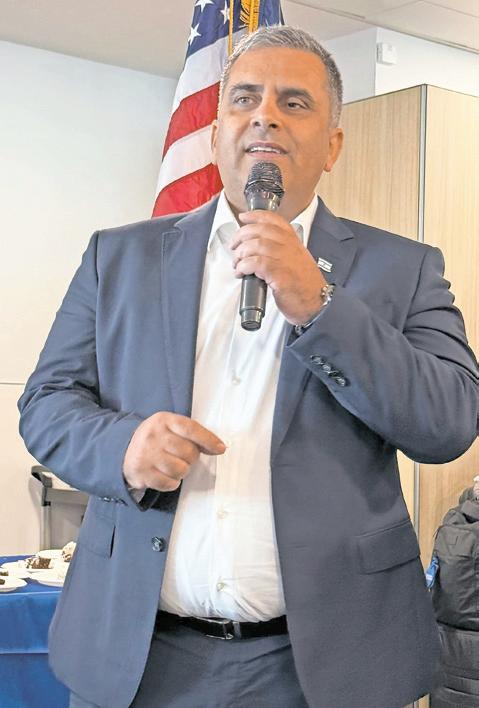
Delivering faster commutes and better transit.
TIMES: DOWN BY 22%*
Faster, smoother rides —more time for you.
*From the Long Island Expressway into the Queens-Midtown Tunnel.
New elevators and ramps coming to Amityville, Copiague, Forest Hills, Hollis, Laurelton, Lindenhurst, Locust Manor, Massapequa Park, St. Albans, and Valley Stream.
RELIABLE POWER = RELIABLE SERVICE
Major substation replacement at Jamaica Station to power better, faster rides for the LIRR.
Structural improvements like track upgrades, bridge repair, and more are coming to stations that need it most on Long Island.






By Natan Galula, JNS
Israel’s Ministry of Heritage has invested a million shekels (nearly $300,000) to locate the remains of the Altalena, the Irgun cargo ship that the newly created IDF shelled in a violent confrontation off the Tel Aviv beach in June 1948, public broadcaster Kan’s Reshet Bet radio station reported on Monday.
About a year after the battle, the Altalena, which had run aground at the foot of David Frischmann Street, was refloated, towed 15 miles out to sea, and sunk.
The search is still in its preliminary stage, intended to identify the area where the remains are located.
Some Hebrew media reports said the government was considering refloating the ship once it is found, but that such a project would require significant resources.
The goal of the search is to convey a message against internal division, while also raising awareness of the important historical role of the Revisionist Zionists, the ideological forefathers of the Likud Party.
The Altalena Affair was one of the most dramatic political events in the early history of the modern-day Jewish state.
The ship, carrying weapons and fighters, was operated by the Irgun, a Zionist paramilitary group during British Mandatory Palestine, an ideological offshoot of Revisionist Zionism.
Led at the time by Menachem Begin, who later became the leader of the Likud Party and then prime minister from 1977 to 1983, the Irgun struck an agreement with then-Prime Minister David Ben-Gurion’s provisional government to integrate its units into the Israel Defense Forces — the successor to the Haganah — on June 1, 1948.
Preparations for purchasing and sailing the Altalena were made before cementing the agreement and took longer than expected.
Unbeknown to Begin, the ship raised anchor on June 11 from Port-de-Bouc, France and set sail on the same day that the first truce of the War of Independence began. The truce banned new weapons and fighters.
Another point of contention was Begin’s request to transfer 20% of the ship’s weapons to the Irgun’s Jerusalem Battalion, which was not incorporated into the IDF due to the city’s international status.
The vessel arrived at Israeli shores on June 20, and began to unload its cargo in Kfar Vitkin, a small town near Netanya. The provisional government ordered the Irgun to hand over all weapons to the IDF and assigned a military brigade to use force if necessary.
The sides failed to reach an agreement, shots were fired and two IDF soldiers and six Irgun fighters died. It is disputed which side fired first.
Begin ordered the ship to sail to Tel Aviv, where the Irgun had more supporters. The Altalena arrived at midnight as locals, journalists and UN observers watched the scene unfold.
Violent clashes resumed the following day. The IDF employed heavy guns and started shelling the vessel. Begin, who went on board the ship, ordered his men to stand down in an attempt to avert civil war.
Despite raising a white flag, the firing continued, with confrontations erupting on the beach and throughout Tel Aviv between IDF and Irgun forces. A ceasefire was struck on June 22, followed by mass arrests of Irgun members. In total, 16 Irgun fighters and three IDF soldiers were killed.
As noted above, the Altalena was later sunk some 15 miles offshore.
In a Cabinet meeting this week, Minister of Heritage Amichai Eliyahu said that the government was working to locate the ship, and that in the meantime, the “holy cannon” used to shell Al-

talena should be placed at the Menachem Begin Heritage Center in Jerusalem, the Makor Rishon newspaper reported.
The “holy cannon” was a nickname given to the heavy gun that fired on the Altalena, to express the supposed righteousness of the decision to subdue the Irgun with violence — a term that many Israelis deem offensive to this day.
Justice Minister Yariv Levin agreed with Eliyahu, saying that the Altalena should “become a monument and a symbol of the bravery of the Revisionists,” according to Makor Rishon.
“For years, the legacy of the Revisionists was suppressed,” the heritage minister told Israel’s Channel 14. “What interests us is not the steel of the Altalena but the story, the wound.”
Herzl Makov, CEO of the Begin Heritage Cen-
ter, said in 2012 that the location of the vessel is known, but reaching it is technologically challenging, Makor Rishon reported.
Previous attempts have used means suitable for shallow waters, but the Altalena is probably farther down.
“The equipment we had at the time couldn’t reach such depths,” Makov was quoted as saying. “What we do have from that search is a radar image that showed the remains of a ship resembling the Altalena. But we don’t have a clear picture, and the cost of equipment capable of reaching those depths is much higher.”
Makov noted that the “holy cannon” currently displayed at the Glilot military base in Ramat Hasharon is not the actual cannon that shelled the Altalena in 1948, but rather one of the same type.







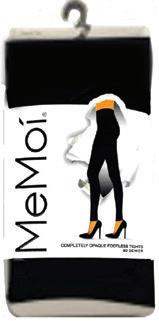







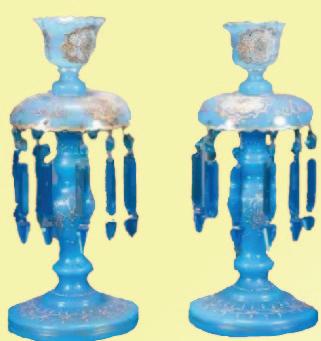








By Amelie Botbol, JNS
Hamas’s embrace of “death culture” is beyond comprehension for much of the world, Mosab Hassan Yousef, the eldest son of Sheikh Hassan Yousef, founder of the terrorist group, told JNS.
Yousef spoke at a briefing hosted in Tel Aviv by the Jerusalem Center for Security and Foreign Affairs (JCFA), titled “Exposing and Expelling Hamas — The Ideology Behind October 7 and Hostage Warfare.” The event featured Yousef alongside Luis Har, a former Hamas captive rescued in an IDF operation in February 2024, and JCFA President Dan Diker.
“It is beyond understanding that some people are willing to sacrifice human life for political gains, or worse for financial gains. I am a living example of this,” said Yousef. “My father had to choose between his eldest son and the cause and he chose the cause.”
Born in Ramallah in 1978, Yousef grew up within the Hamas movement, and was imprisoned several times by the Israel Security Agency (Shin Bet). While in an Israeli prison, he was approached about becoming an ISA informant.
He agreed, initially intending to act as a double agent to protect his father and family. Over time, however, disillusionment with Hamas’ ideology led him to embrace Christianity and work with Israel to save lives on both sides. He served as an undercover operative for nearly a decade.
Yousef said he understood that “if Hamas succeeded and destroyed Israel, they would come after the Arabs, after Muslim sects and after the West.”
Hamas, he said, does not believe in nationalism or political borders but uses Palestine as a more appealing banner than Islam.
“When I see the moral decay within the Muslim population, the slaughter of toddlers, kidnapping of Holocaust survivors, of innocent civilians who were actually mostly pro two-state solution, I
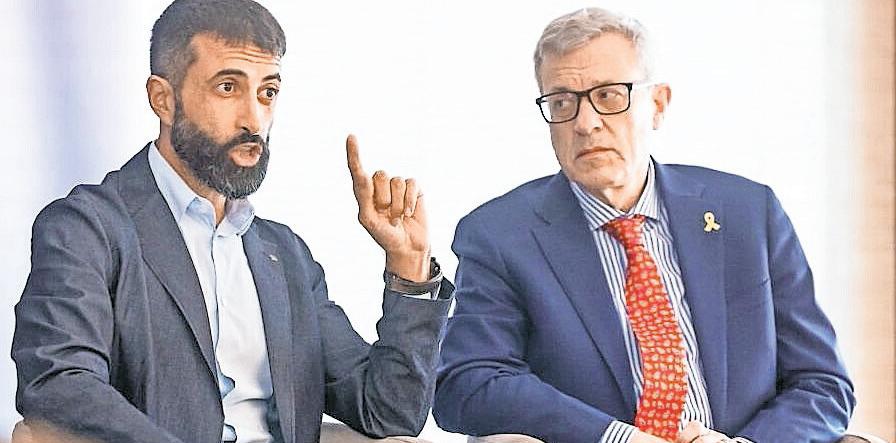
feel we have betrayed them,” he continued.
“I am afraid that if we betray the Jewish people after all its contribution to life — sharing all the innovation, science, literature, morality, ethics and values with the rest of the world — and then punish them for being successful for the sake of the Muslim majority, this means that we are in big trouble.”
“The more we show tolerance, the more it will be perceived as weakness and ignite their bloodlust,” he warned.
In lieu of a Palestinian state, Yousef suggested an Arab federation and cooperation with the State of Israel.
“I prefer for my people economy, education, infrastructure, cooperation with Israel and to start mending bridges,” he said.
“I would like Israel to assume security and I would like the rest of the world to give our people an economy. This will guarantee the creation
of a new generation and cut the weight of all these opportunists who use the name Palestine as a device to harm Arabs and Jews.”
JCFA President Diker told JNS that the timing of the center’s diplomatic and foreign media event was deliberate.
“It’s a critical moment because of the real urgency of where we are in Gaza. … It was crucial for the JCFA “to point out the security dangers that Israel and the free world face together, as well as the Middle East, from Hamas — as Mosab [Hassan Yousef] mentioned.”
He warned of the upcoming UN General Assembly vote on a resolution supporting Palestinian statehood, calling it the “death nail to peace and security in the Middle East and around the world.”
“The implications of jihad by Hamas are not only for Israel,” he said. “As [former Al Qaeda leader Osama] Bin Laden stated, it is not only the
far enemy — America and Israel — but also the near enemy: secular or more amenable, westernminded regimes in the Middle East. This moment has international consequences and implications.”
Diker cautioned that recognizing Palestinian statehood in the wake of Hamas’s Oct. 7 atrocities would send a dangerous signal.
“If we wanted to give a prize for [Hamas’s] AlAqsa Flood invasion — mass murder, mass rape and mass kidnapping of nationals from 20 countries, almost all of them represented in this room — the prize for Hamas would be the recognition of a Palestinian state. The message that conveys is that mass murder, invasion, kidnapping, rape and torture pays,” he told the gathering.
Former Hamas captive Luis Har bore witness to the terror group’s atrocities, recounting his kidnapping and months in captivity.
On Oct. 6, Har was staying at the Kibbutz Nir Yitzhak home of his partner, Clara Marman. At 6:30 am the next morning, rocket sirens sounded, and the family sought shelter. Inside the house with them were Clara’s brother Fernando, sister Gabriela, niece Mia and their dog, Bella.
When Hamas launched its invasion, all five were abducted, forced into a Toyota pickup truck, and driven into Gaza, where they were held in Rafah. Clara, Gabriela, Mia, and Bella were freed on the 53rd day of the war. Har and Fernando were rescued by the IDF on day 129.
Speaking to JNS, Har stressed the importance of testifying about his ordeal, urging people “not to forget Oct. 7.”
“People tend to put it aside. It’s very important to remember what happened so that it will not happen again, or so that we will be ready in case something like this ever happens again,” he said. The discussion was moderated by JCFA Director of Content and podcast host Sarah Martinez-Amir.

At The Jewish Star, selling advertising for the newspaper is just part of the job.
Our staff’s toolkit includes an exceptionally broad range of useful products (including both religious and secular publications and websites; digital, email, radio and social media marketing; in-person events; direct mail; commercial printing, and more) — whatever it takes to build business and raise revenue for our commercial and non-profit partners.
Employees are trained by the best in the business, in a supportive, collegial and kosher environment.
These F/T positions (P/T schedules may be arranged) offer competitive compensation ($40k-$90k) with excellent commission and bonus opportunities, paid holidays (including Jewish holidays), time off, medical and 401(k).

—Lisa Basini, Baking Coach, Bellport
Lisa’s passion is baking. Opening a store was a big step—one she made with support from PSEG Long Island’s Business First Program. She earned incentives for choosing a vacant space and rebates for upgrading to efficient LED lighting. Now, she’s saving on energy costs and her thriving business has made life a little sweeter for all of us.
By Linda Gradstein, JNS
When I was growing up in Long Island decades ago, a common bar or bat mitzvah gift was a certificate stating that a tree had been planted in the youngster’s honor. It was often accompanied by a tongue-in-cheek card which might have said, “Mazel Tov! Your day to water your tree is Monday.”
In Israel today, it’s now possible to visit “your” tree as part of a new project called “My Tree in Israel,” a way for participants to feel that they are partners in an Israeli business.
The largest program in “My Tree” is the olive grove on Moshav Hayogev in the Jezreel Valley in northern Israel, featuring 2,200 trees of Barnea olives, which produce a particularly smooth olive oil.
Participants pay $250 a year, and in exchange get six bottles of extra-virgin olive oil made at the neighboring high-tech olive oil press, the largest in the Middle East, and shipped to homes all over the world. Participants can design their own labels and many use the olive oil as holiday gifts to friends and family.
“The idea is to support Israel, and to strengthen connections with individual Israeli farmers,” Kobi Assaf, the founder and CEO, told JNS. Synagogues and churches can adopt a group of trees, he said. Individuals can also adopt a tree and place a wooden plaque in honor or in memory of someone special.
There are trees adopted in honor of President Donald Trump and US Ambassador to Israel Mike Huckabee. A tree in memory of the Bibas family and the two little red-headed boys, Kfir and Ariel, will be inaugurated soon.
There are also trees adopted in memory of fallen Israeli soldiers, including a 20-year-old special forces soldier named Reef Harush, who was killed fighting in Gaza in April 2024. Harush had been in the army just eight months and was sup-
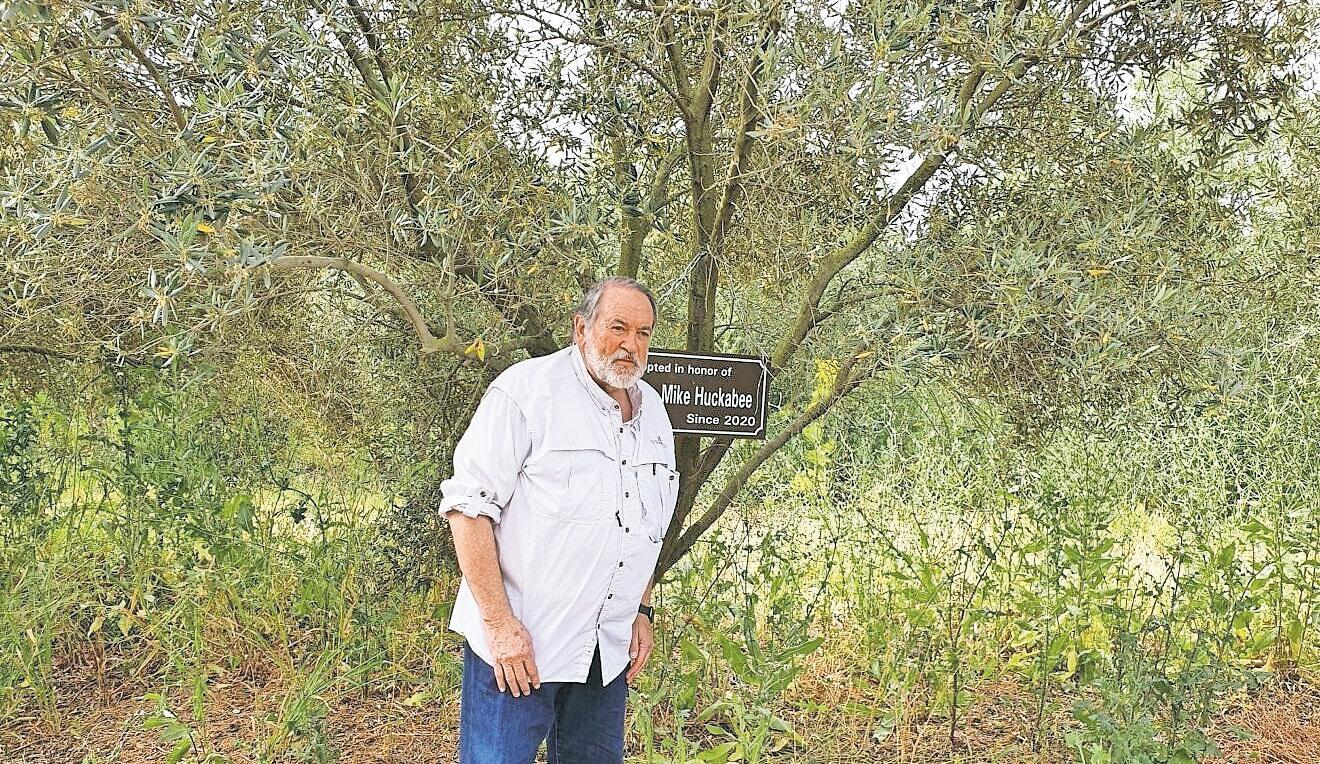
posed to still be in training for the elite Egoz unit, but was rushed to Gaza because of the war.
On a recent scorching day, his father, Avi, came to see the tree for the first time.
If you’re into a different type of liquid refreshment, you can “adopt” a grapevine at the Jezreel Valley Winery, which produces 80,000 bottles a year. Participants receive 6 bottles of wine shipped to them for a yearly fee of $360. There are several options available for different wines and in the service of readers, I tasted two of them: a slightly off-dry Gewurztraminer and a red Megiddo blend of Shiraz and Cabernet Sauvignon.
The Jezreel Valley Winery, founded in 2012, produces 80,000 bottles a year, and its product is even served in several Michelin-star restaurants in Europe.
“We decided to use local grapes like shiraz, Carignan and argaman,” said Tal Raviv, one of the winemakers. “Our vision is to make wine with grapes that are growing here in this area but most of all wine should be fun and tasty.”
As with the olive oil, you can personalize the label and share your gift with friends and family.
If you’re not into olive oil or wine but like whisky, My Tree has yet another option— an investment in part of a whisky cask at the Golan Heights Distillery, founded by Canadian immigrants David and Alona Zibell, which makes Israel’s first 100 percent locally crafted whisky.
For an investment of $450, you receive six bottles of Golani Black Lifestyle Whisky, a single-grain whisky aged in charred barrels. As with the olive trees or grapevines, you are welcome to visit your whisky barrel (and do some
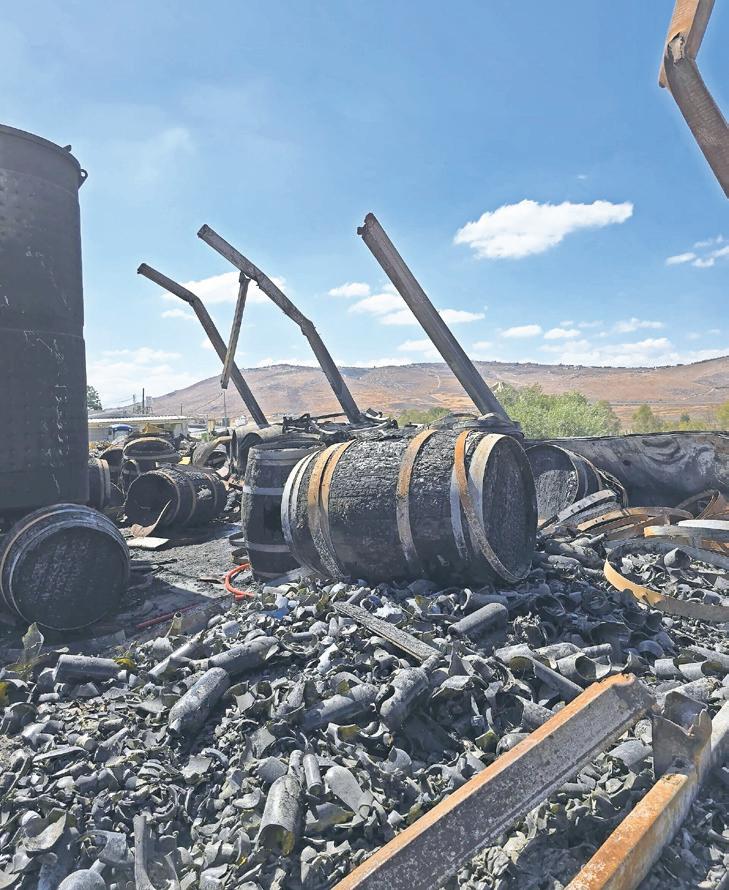
tasting while you’re there).
Kobi Assaf of My Tree in Israel said that about half of their participants are Jews, including synagogues and JCCs, while the other half are Evangelical Christians.
My Tree in Israel is also helping the Avivim Winery, a few hundred yards from the border with Lebanon, which was destroyed by a missile fired from Hezbollah.
At the winery, you can still see the charred winery equipment and glass crunches underfoot. Yisrael Biton, who runs the winery, says they managed to save 30,000 of the 300,000 bottles that were in the winery as well as several casks of wine. My Tree in Israel is helping to sell the wine and a new winery is already under construction.
DESK of RABBI S.M. LEINER- INSURANCE BROKER 917-543-0497
Note the ACCOLADES from our CLIENTS
RE: SYNAGOGUES and YESHIVOS
Dear Rabbi Leiner,
Thank you for replacing the Insurance for our Synagogue, with a Savings of almost 50%.
B.F. Executive Director
RE: REAL ESTATE CORPORATION
Dear Rabbi Leiner, You and Your Experts, have saved our Corp. Very Substantial Sums, with your Quality Insurance Replacement on our Real Estate Buildings. Thank you, M.B. Pres.
RE: HOMEOWNERS INSURANCE
Dear Rabbi Leiner, Our Insurance Company Refused to renew our Insurance Homeowners Policy. However, You and Your Experts were able to Secure for us other Insurance Coverage, even at a much lower Premium, than the Prior Canceled Insurance Policy. Thank You So Much. Mrs. D.S.
mountsinai.org/southnassau
By Dave Gordon, JNS
Goldie Morgentaler was going through her late mother Chava Rosenfarb’s belongings in 2011 when she found a package of letters in Polish. When Morgentaler opened them, she was surprised to see that they weren’t addressed to her mother. Rosenfarb had penned them to her friend and fellow Holocaust survivor, Zenia Larsson.
Rosenfarb and Larsson, both from Lodz and who both launched literary careers — the former in Canada and the latter in Sweden — corresponded across continents from December 1945 until December 1971. At some point in the early 1970s, Larsson sent back all of Rosenfarb’s letters, without explanation.
“It caused hurt and was painful,” Morgentaler, professor emerita of English literature at the University of Lethbridge in Alberta, told JNS. “It almost broke up the friendship, because my mother thought that this was Zenia’s way of saying that she didn’t want to be friends anymore — whereas Zenia had other ideas in mind.”
Out of a sense of obligation, Rosenfarb returned Larsson’s letters. Larsson planned to publish a book based on her own letters, which she did in 1972. She sent a copy to Rosenfarb with an inscription.
In a new book about her mother’s letters to Larsson, Morgentaler writes that Larsson’s book drew on Rosenfarb’s letters but altered details, including Rosenfarb’s physical description, and changed many names.
“Once I had the two sides of the correspondence, I thought I could put it together and it might make an interesting book,” Morgentaler said of her book “Letters from the Afterlife: The Post-Holocaust Correspondence of Chava Rosenfarb and Zenia Larsson,” which was published in June.
Larsson wrote novels in Swedish and Rosen-
farb penned books in Yiddish, but they corresponded in Polish, their shared tongue. The letters reveal a range of emotions.
“My mother is describing her joy at being a mother and having a baby, and she’s constantly kissing me and she can’t get over what a wonder it is to have a child,” Morgentaler said. “I found that very moving.”
Rosenfarb and Larsson survived Nazi ghettos and concentration camps, including the Lodz ghetto, Auschwitz and Bergen-Belsen.
Larsson’s novels in the early 1960s about the Lodz ghetto and her experiences in the Holocaust were widely sold in Sweden, according to Morgentaler.
“They made a huge impact, because they were available in Swedish, and it was one of the first accounts of the Holocaust that the Swedes had read about,” she said.
Morgentaler’s book chronicles her mother’s and Larsson’s efforts to navigate life in unfamiliar countries with new languages and cultures.
“What moved me the most was how unsettled Chava felt when she was living in Brussels,” Morgentaler said. “She and my father had no right to stay in Belgium, so they were essentially stateless, and they spent almost five years trying to figure out how to make the future happen for them.”
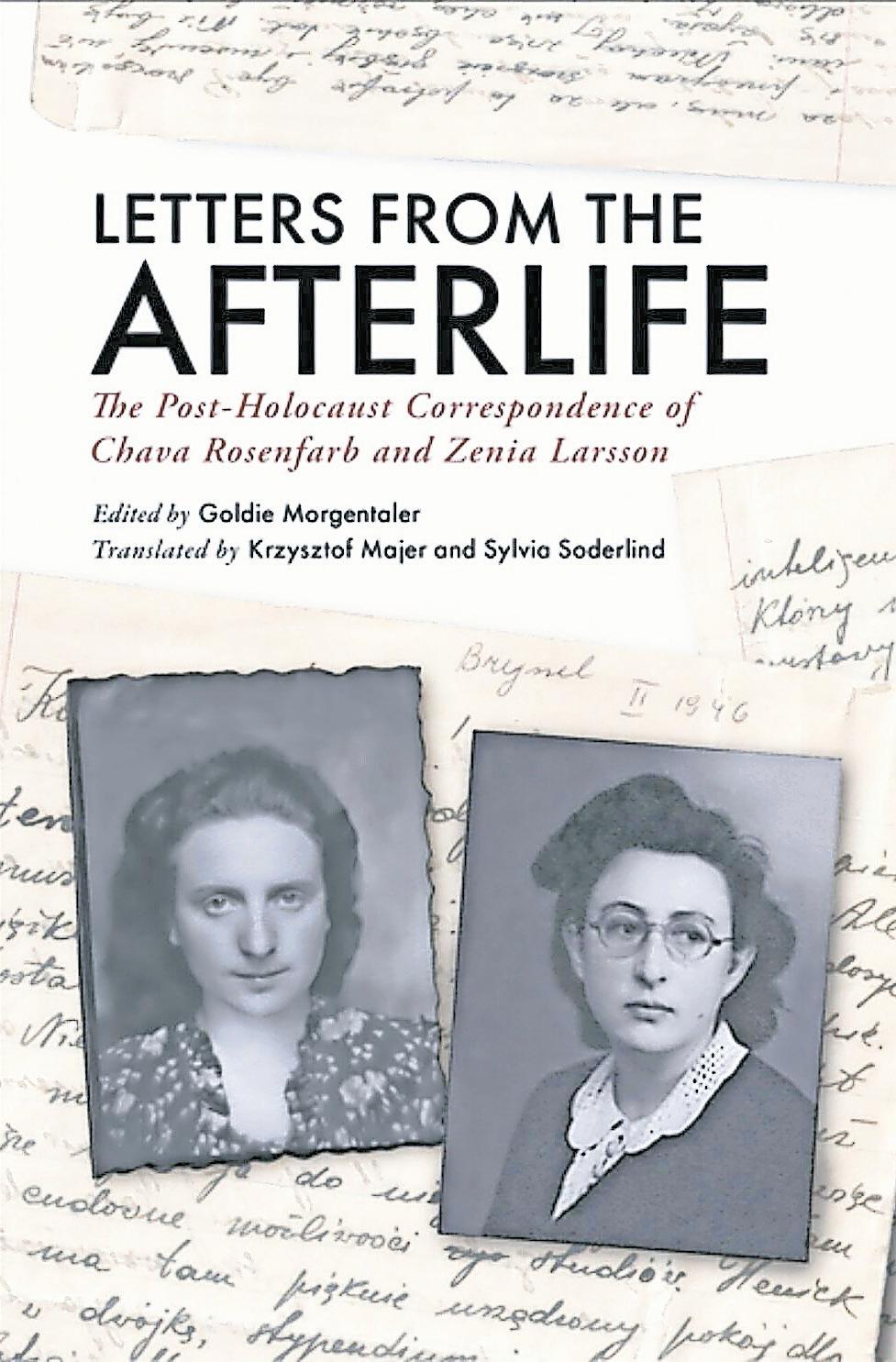
At first, Morgentaler’s parents thought they would return to Germany. Then they thought about Argentina, where her mother’s family lived. “Maybe the United States will accept them, as it accepted my father’s younger brother, who was considered a war orphan,” she said. “That doesn’t work either.”

“I think the letters bring home how unsettling it can be not to have a country of one’s own and to be constantly knocking on doors to be let in and accepted,” Morgentaler said. “I knew some of this intellectually before I read Chava’s letters, but the letters really brought it home.”
The letters capture powerful personal moments, including when Rosenfarb described her anguish seeing the body of Larsson’s father, who committed suicide in the ghetto so that his wife and daughter could inherit his food rations.
Larsson confessed to Rosenfarb that she felt lonely after losing her stepmother just after liberation.
“I am totally, utterly alone,” she wrote, recounting a near-tragic accident in Stockholm that made her question the value of her survival.
Rosenfarb agonizes in the letters about refusing even a comforting word to a poet named Shayevitch, who was in love with her, during their transport to Auschwitz. Shayevitch was later killed in the gas chambers at Dachau.
The letters also underscore the two women’s different experiences after the war.
“The early letters describe one plan after another,” Morgentaler said. “In fact, most countries wouldn’t accept them.”
Canada did eventually, when Rosenfarb’s Yiddish publisher, based in Montreal, sponsored her immigration. Morgentaler’s father, Henry, had distant cousins living in Montreal, one of whom lied on the application, stating that she was Henry’s sister.
Rosenfarb was lucky to have survived with her mother and sister and settled in Brussels with the help of socialist Bund activists. She initially lived in a cramped attic but gradually rebuilt her life within a supportive community. Larsson’s path was lonelier and more fraught. She distanced herself from family and tried to sever ties with “war-torn” Europe. She resolved not to correspond with Rosenfarb in 1945 while she was displaced in Germany. “The only thing I want is revenge,” she said.
In 1969, the two women and their families met on a vacation to Mallorca, Spain.
Morgentaler hopes the book will serve as a “historical document” that captures “history on the fly,” illuminating both the immigrant and survivor experiences, she said.




EthEL G. hOFMAN

osh Hashana falls late on the calendar this year, at the end of the back-to-school month and at the beginning of the first signs of fall. No matter; somehow, there are always those last-minute guests and added recipes that cause a flurry of activity in Jewish households right down to the wire. This year, the holiday starts after sundown on Monday, Sept. 22. With the time ahead of the holiday, whip up a few dishes, slip them into the freezer and forget about them until the holiday is near. Besides the ubiquitous brisket and chicken, soups and casseroles galore may be cooked, cooled, sealed and frozen. Just don’t forget to label each one, adding key codes such as pareve, meat or dairy. It’s no big deal to cut up salads the night before. Chunks of tomato, cucumber and shredded basil stay just fine overnight. Toss with a little olive oil, some lemon or lime, and salt and fresh pepper just before serving. Cream soups, however, do not freeze well. The soup will separate, and the texture will become grainy; those are best prepared fresh or make the night before and refrigerate. For thawed soups, the seasonings may need to be adjusted as flavors are reduced by the cold.
And what’s a Jewish holiday without a kugel? My grandkids, home from college, will expect my Pineapple Applesauce Kugel; and for dairy meals, a Rich Banana Dessert Kugel. Both freeze exceedingly well. Another must-have on the table is the ubiquitous honey cake. Try a seasonal variation: Pumpkin Honey Cake, which is moist, dark and delicious.
Ophra’s Mushroom Soup (Dairy, Vegetarian,
Longtime home cook Ophra Kimberg generously shared this recipe with me Serves 6; recipe may be doubled.
Cook’s Tips: •Cauliflower is the soup thickener. •Chopped onions are available fresh or frozen. •Buy canned mushrooms, pieces and stems. •Cauliflower should be soft before adding to onions and mushrooms. •When doubling the recipe, freeze in two batches. •For a pareve dish, substitute olive oil for butter. •For a dairy dish, top with a spoonful of sour cream or plain yogurt.
Ingredients:
• 1 cup cauliflower florets
• 3 Tbsp. butter
• 1/2 cup diced onions
• 1 can (14 oz.), plus 1 (7 oz.) can mushrooms, stems and pieces, drained
• 2 tsp. bottled chopped garlic
• 1/8 tsp. dried thyme
• 2 tsp. pareve bouillon powder
• 3 cups vegetarian broth
• white pepper and salt to taste
Directions:
Place cauliflower in a microwave-safe dish with 1 to 2 Tbsp. water. Cover loosely with plastic wrap. Microwave 4 minutes or until very soft. Drain. Set aside.
In a medium saucepan, melt butter over medium heat. Add the cauliflower, onions, mushrooms, garlic, thyme and bouillon powder. Cook over medium heat until onion is transparent.

Simmer for 10 minutes, stirring often. Cool slightly before transferring to food processor. Add the broth and process until slightly grainy (longer if a smoother mixture is preferred). Season to taste with white pepper and salt. Cool before pouring into a container. Cover tightly, label and freeze.
Super-easy: Just place all ingredients, except the ginger, in blender and whirl. Serve chilled. Serves 6 Cook’s Tips: •Use fresh squeezed lemon juice, not bottled. •Ginger root, not powdered ginger, should be used. •May substitute apple juice for orange juice. •For a dairy soup, stir 1/2 cup sour cream or plain yogurt into thawed soup.
•If too thick, add a little more orange juice.
Ingredients:
• 1 (15 oz.) can pitted cherries, drained
• 1 cup whole cranberry sauce
• 5 Tbsp. fresh lemon juice (from 2 large lemons)
• 1 cup orange juice
• 1/2 cup water
• 1 slice (1/2-inch thick) challah or white bread, crumbled
• 2 to 3 Tbsp. coarsely grated ginger root to taste
Directions:
Place all ingredients, except ginger root in blender jar or food processor. Whirl until smooth. Stir in grated ginger root to taste. Pour into freezer container, cover tightly, label and freeze.
Taste-tingling and hearty. Nobody stops at just one bowl. I stood at the elbow of Mrs. Sonnenschein, my 90-year-old Florida neighbor, as she cooked and stirred. Serves 12.
Cook’s Tips: •Use ready chopped fresh or frozen onions. •Purchase ready-to-buy, preshredded cabbage and shredded carrot. •Divide soup into two containers. Defrost one for smaller groups.
Ingredients:
• 2 Tbsp. vegetable oil
• 3 cups chopped frozen onions
• 1 tsp. salt
• 3 pkg. (14 oz. each) shredded cabbage
• 1 cup shredded carrot
• 2 Tbsp. pareve bouillon granules
• 1 (46 oz.) can tomato juice
• 1 (14-1/2 oz.) can Italian-style chopped tomatoes
• 3 to 4 bay leaves
• Juice of 3 large lemons
• 1/2 cup brown sugar, packed or to taste
• 1/8 tsp. white pepper or to taste
Directions:
In large pot, heat vegetable oil over medium heat. Add onions and salt. Cover, reduce heat to low. Cook, stirring occasionally, until onions are golden, about 30 minutes. Add cabbage, carrot and bouillon.
Stir, cover and cook 20 minutes longer to soften cabbage. Add remaining ingredients. Partially cover, simmer 30 minutes longer. Adjust seasonings.
Cool before pouring into containers to freeze.
Serves 24
Cook’s Tips: •Don’t be intimidated by the long ingredient list or directions. Ingredients are all ready to use. •May divide ingredients into two containers each that serves 10 to 12. •Fullfat ricotta, sour cream and milk may be used, if desired. •Dry thawed chopped spinach by rolling tightly in clean tea towel. •Reheat, thawed, at 325 degrees, for 40 minutes, or until hot and bubbly.
Ingredients:
• 1 (16 oz.) package skim-milk ricotta cheese
• 1 (16 oz.) package low-fat sour cream
• 1/2 cup skim milk
• 1-1/4 tsp. freshly ground pepper


• 1 (16 oz.) jar meatless spaghetti sauce
• 1 (10.5 oz.) “no cook” lasagna noodles
• 1 (12 oz.) jar roasted sliced red peppers, drained
• 1 (12 oz.) jar marinated artichoke hearts, drained and quartered
• 1-1/2 cups frozen chopped spinach, thawed and squeezed dry
• 2 tsp. garlic powder
• 1/3 cup grated Parmesan cheese
• 3/4 cup water
Directions:
Preheat oven to 375 degrees. Spray a 13x9inch lasagna pan with nonstick vegetable spray. In a bowl, mix the ricotta cheese, sour cream, skim milk and pepper. Set aside.
Spread half the spaghetti sauce over the bottom of prepared pan. Cover with 3 lasagna noodles and top with about 1/3 cheese mixture. Cover with roasted pepper and half the artichokes. Repeat with 3 lasagna noodles and half the remaining cheese mixture.
Cover with remaining artichokes and the spinach. Top with remaining cheese mixture. Sprinkle with garlic powder and Parmesan cheese. Pour 3/4 cup water into one corner of pan, tilting to distribute water to other corners. Cover tightly to seal with heavy-duty foil.
Bake in preheated oven for 1 hour. Uncover and bake 15 minutes longer. Cool completely before sealing with foil. Label and freeze.
Serves 8 to 10
Cook’s Tips: •Recipe may be doubled using a large baking dish. •May use a pareve granola topping instead of crushed cornflakes. •Substitute canned pineapple for fresh.
Ingredients:
• 1/2 lb. medium egg noodles, cooked and drained
• 5 eggs
• 1/4 cup vegetable oil
• 2 cups chopped fresh pineapple
• 1 (16-oz. jar) chunky applesauce
• 3/4 cup sugar
• 1-1/2 tsp. cinnamon, divided
• 1/3 cup crushed cornflakes
Directions:
Preheat oven to 375 degrees. Spray a 9x12inch baking dish with nonstick vegetable spray. In a large bowl, whisk eggs with oil, pineapple, applesauce, sugar and 1 teaspoon cinnamon. Add the slightly cooled noodles. Stir to mix. Transfer to prepared baking dish. Sprinkle cornflakes evenly over noodle mixture. Sprinkle with remaining cinnamon. Bake in preheated oven 45 minutes or until slightly moist in center. Cool, cover tightly with foil and freeze.
Hofman on page 15


































































By Rolene Marks, JNS
How do grateful Israelis show their thanks to the soldiers of the Israel Defense Forces for defending Israel? One response has been quintessentially Israeli — by feeding them well with kosher meat.
Since Oct. 7, 2023, volunteers have joined organizations such Grilling for Israel (formerly Grilling for IDF), Grills of Hope and others to provide delicious meals in a show of gratitude.
For troops returning to base, battle weary, hungry and exhausted, the promise of a sizzling barbecue coupled with the support of the volunteers who show up event after event is more than a morale booster — it is a reminder of who and what they are fighting for.
Elliott Auerbacher, who made aliyah from Englewood, NJ, and lives in Modi’in, founded Grilling for Israel together with Dave Kaplan, an immigrant from Toronto, in 2020.
Prior to the Hamas attack on Oct. 7, Grilling for Israel had served 11,000 meals to IDF soldiers. Since Oct. 7, more than 209,000 meals have been served, with more than 10,000 volunteers joining at least one event.
Auerbacher and his crew barbecue for wounded soldiers in hospitals across Israel as well as for soldiers on base.
Their most meaningful events are the popular
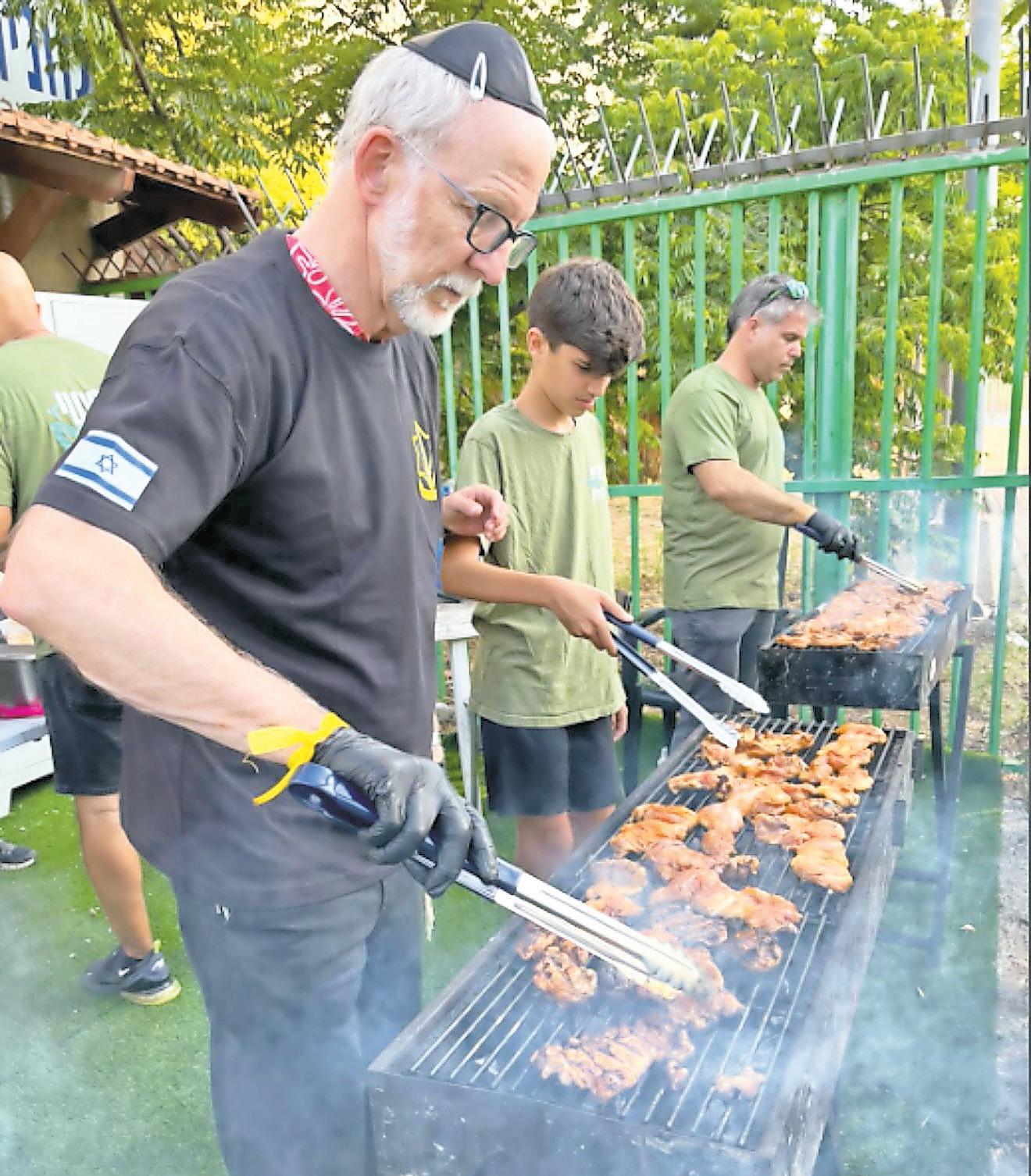

A“Tuesday Night BBQs” at Sheba Medical Center (Tel Hashomer) in Tel Aviv, titled “Feeding Bodies, Lifting Spirits.”
Some soldiers arrive on their crutches, others in wheelchairs, a few carry guitars to help “create a vibe that gives them respite from their physical pain.” Auerbacher’s now legendary brisket is a crowd pleaser, along with steaks, burgers, salads, drinks and desserts.
“It’s not simply a barbecue — it’s the fuel for their engine,” Auerbacher concluded.
Grills of Hope was founded by meat-loving former South Africans, including Rafi Sandler and Jonathan Bloomin, in the days after the attacks of Oct. 7.
“It was Oct. 8. Everyone was at home, glued to the news, feeling helpless. By the next day, I realized we couldn’t just sit and watch,” Sandler told JNS. “One of the most urgent needs coming from the field was hot food. Many soldiers had been rushed to remote locations without proper supplies and they were literally hungry.”
Sandler called their first barbecue on Oct. 9 “incredible.”
“The soldiers were motivated but alone, nervous and exhausted,” he recalled. “They needed it and honestly, so did we. I posted on Facebook, saying, ‘If you’re a unit that needs food, send us your details.’ Within hours, over 100 requests came in. Very quickly, we built a logo, printed t-shirts, launched donation links, and started a WhatsApp group. Volunteers poured in. Donations came from abroad. A grassroots effort became a full-blown operation.”
Co-founder Bloom said, “Once we get through the security at the various bases and the soldiers see the meat and the spread we bring, the whole mood changes and they call all their friends. For many, this is the first decent meal they will get, possibly for weeks.”
There are also more somber, even heartbreaking days.
“We have had days where barbecues have been cancelled because soldiers in that particular unit have been killed that day,” Bloom said.
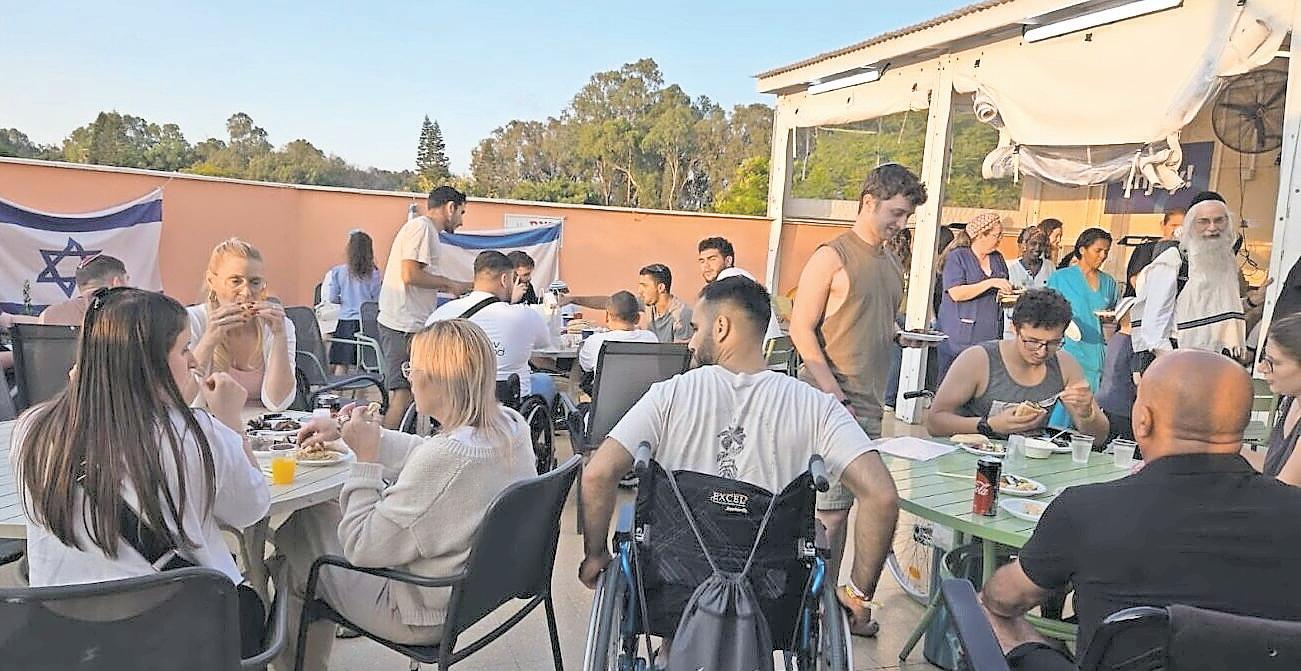
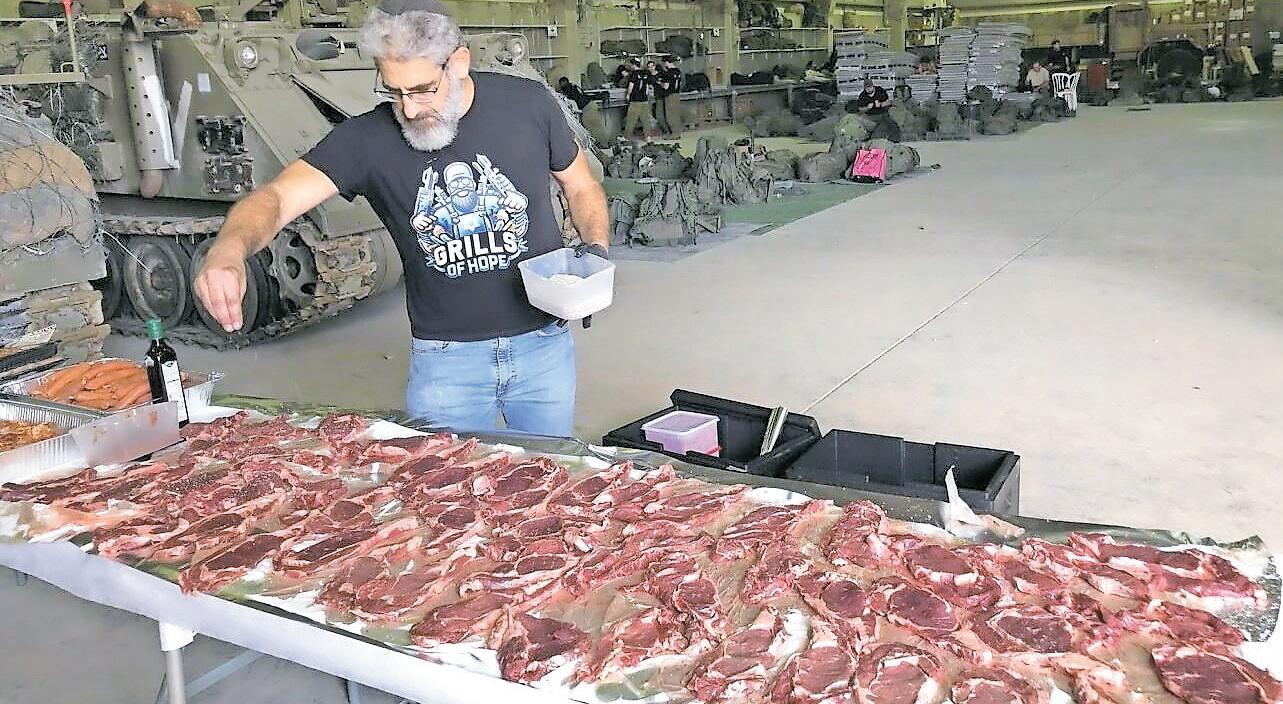
“We have done barbecues where someone we met was killed a day or two later.”
Grills of Hope runs a WhatsApp group led by Bloom. Details about upcoming barbecues and requirements are posted there. Volunteers can help with prepping salads, buying supplies, grilling or just coming along to boost morale.
Sandler shared an anecdote that left a lasting impression. “A Yemenite Jewish soldier met one of our volunteers, an older British woman.
He looked at her and said, ‘You remind me of my grandmother.’ That kind of connection breaks barriers. It was beautiful.”
For Israel’s soldiers and everyone involved in maintaining the grills and providing tasty barbecues, it is not just about the food, but lasting memories. “We’ve grilled during blackouts, danced in rain, hugged soldiers who hadn’t seen home in weeks,” Sandler said. “These barbecues have become spaces of healing.”
By Etgar Lefkovits, JNS
ACHZIV, Israel — On the grounds of a national park opposite the Mediterranean coast near the border with Lebanon, the indoor-outdoor café and bakery is bustling anew with activity.
The serene pastoral atmosphere amid the trays of site-made croissants and jugs of freshly squeezed orange juice from Golan Heights produce belie the tension that existed here when the area was evacuated during the 14-month long war with Hezbollah. Most of the residents have since returned to their homes and businesses following the November ceasefire, hoping for a bout of peace but wary of the future.
“You have to be an optimist,” concedes Tomer Suissa, 35, from the small Galilean village of Shavei Tzion, who co-manages and is the pastry chef of the recently reopened Tosha Bakery. “If you are not an optimist, you will not be here.”
Despite its idyllic setting overlooking the sea on the winding coastal road between Acre and Rosh Hanikra, north of Nahariya, it was no easy path for the boutique eatery with the wooden tables under the trees, which opened its doors in 2021 in what was then a no man’s land after earlier working out of a small storefront at Kibbutz Rosh Hanikra and dealing with the financial fallout from the COVID crisis.
“We were looking for a place that was similar to the kibbutz with its pastoral feel, its nature
and its disconnect from reality,” Suissa tells JNS.
But just as the business was taking off, reality came knocking with the Oct. 7, 2023, Hamas-led invasion of southern Israel forcing the bakery to close its doors for the next year and a half as Hezbollah opened another front, this one in their neighborhood.
“We had been accustomed, from Corona [COVID] to an abnormal reality.”
The next day, an army checkpoint went up 330 yards south of the café, with the area declared a closed military zone.
Tens of thousands of Israelis, including those in this pictorial village, were evacuated from their homes in northern Israel during the war as Hezbollah launched some 17,000 projectiles — a mix of rockets, missiles and drones.
Missile fragments pierced the walls of the café. The blasts of shrapnel punctured the pergola. The salty seawater ate away at the outdoor wooden benches.
“We thought we would have to close the place down,” Suissa says.
While they were relocated from their homes, a wartime attempt to join forces with a national bakery chain in central Israel just didn’t make the cut due to the hustle and bustle of the city life it entailed, the antithesis of the country café.
“After several months, it was just too much noise in Tel Aviv,” says Shachaf Avraham, 35,
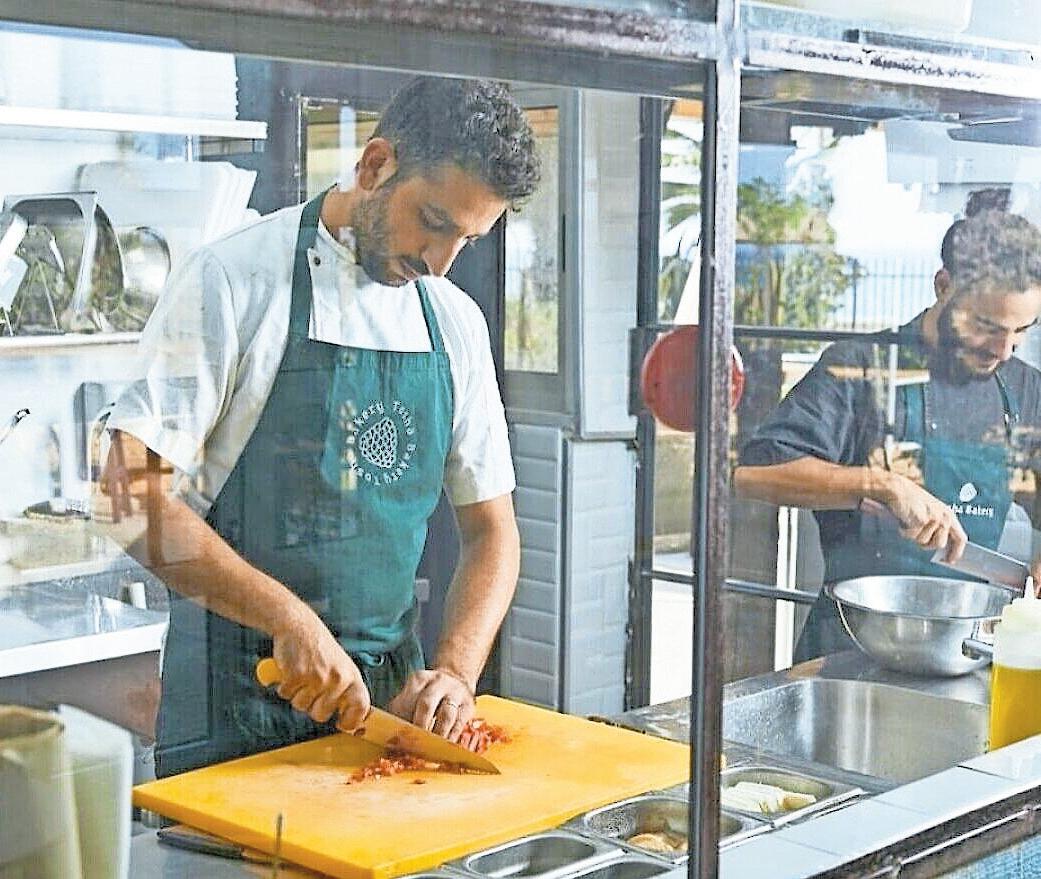
from Nahariya, who manages the commercial side of the café.
After a period of renovation after the war, which they carried out with the help of government compensation, the café reopened its doors this spring, and with it its local customers began to return.
Despite renewed turbulence caused by the 12-day war against Iran in June, when they had to revert to takeout service, the eatery and many other small businesses are trying yet again at renewal.
“I am enchanted by this whole place, with both its delicacy, and simplicity,” offers Kitra Shuveli, 61 from the northern Israeli community of Shimshit, who was luncheoning with two friends. “You have to be a believer and not give up on dreams.”
“Now, even seeing the traffic and the return of people is moving,” says Haya Shrem, 63, who moved back to Nahariya with her husband during the war after a quarter century in the Jezreel Valley.
Amid the tranquility, the Hamas attack nearly two years ago and the current war with Hezbollah remain vivid and salient events in the minds of customers and owners alike, even as the world focuses its attention on Gaza.
“The real feel is that it is not everlasting and that we could wake up with Hezbollah in our living room,” says Dorit Keren, 53, from Kibbutz Matzuvam (aka Metzuba), sipping a coffee at the adjacent gallery. “I am certain that we will yet see a rerun.”
“There is excitement to be back, only it is fragile,” adds Sharon Rotem, 55, from the northern town of Betzet and the owner of the gallery.
“Whoever survived the last five years here is multi-talented,” Suissa observes. “You become hardened and develop the skin of an elephant.”
Still, he would have it no other way. “We’ve returned home,” Suissa says.
Continued from page 12
Serves 8 to 10
Cook’s Tips: •Leave butter and cream cheese at room temperature for several hours to soften. •May use overripe bananas.
Ingredients:
• About half an 8-oz. package of fine egg noodles, cooked and drained
• 2 bananas, thinly sliced
• 1 stick (4 oz.) unsalted butter, softened
• 4 oz. cream cheese, softened
• 1/2 cup sugar
• 3 large eggs
• 1 cup sour cream
• 1 teaspoon vanilla extract
• 1 to 2 tsp. cinnamon-sugar
Directions:
Preheat oven to 350 degrees. Spray a 9-inch square baking dish with nonstick vegetable spray. Spread cooked noodles over bottom of baking dish. Spread bananas over to cover. Set aside. In a large bowl, whip the butter, cream cheese and sugar until pale and fluffy, about 1 to 2 minutes. Beat in eggs, sour cream and vanilla. Pour
over bananas. Sprinkle with cinnamon-sugar. Bake in preheated oven 50 minutes or until almost firm to touch in center.
Cool completely before sealing with aluminum foil, labeling and popping into freezer.
Makes 1 loaf (9x5x3-inch dish) and 1 extra mini-loaf (not individual, but mini-size), or 4 miniloaves.
Cook’s Tips:
•Substitute 2 tsp. cinnamon and 1 teaspoon nutmeg for pumpkin-pie spice.
•Substitute 3/4 cup candied citron peel instead of raisins. •For full-proof nonstick effect, line bottom of loaf pan with waxed paper and spray with nonstick vegetable spray.
Ingredients:
• 4 eggs
• 1 cup dark-brown sugar
• 1/2 cup water
• 1 cup vegetable oil
• 1 cup canned pumpkin (not pumpkinpie) mix
• 3/4 cup molasses
• 1/2 cup honey, warmed
• 2 cups whole-wheat flour
• 1 cup all-purpose flour
• 2 tsp. baking soda
• 1 Tbsp. pumpkin-pie spice
• 1-1/4 cups dark or golden raisins
Directions:
Preheat oven to 350 degrees. Spray loaf pan and extra mini-loaf pan (or 4 mini-loaf pans) with nonstick vegetable spray with flour.
Beat eggs and sugar until blended. Add the water, vegetable oil, pumpkin, molasses and honey. Mix well. Stir in the flours, about 1/2 cup at a time, mixing to blend between each addition. Stir in the baking soda, spice and 1 cup raisins. Spoon into prepared pan(s). Scatter remaining raisins on top.
Bake in preheated oven for 50 to 60 minutes or until a toothpick inserted in center comes out clean. Bake mini-loaves 45 minutes or until toothpick comes out clean when inserted in center.
Cool in pan 10 minutes. Loosen edges by running a round bladed knife around. Turn out onto a wire tray. Cool completely. Wrap and freeze.
Serves 8 to 10
Cook’s Tips: •May substitute whipped topping for whipped cream.
Ingredients:
• 1-1/2 pints frozen vanilla yogurt, softened
• 1/4 cup miniature chocolate chips
• 2 Tbsp. sherry

• 1-1/4 cups stiffly whipped cream
• 1 cup ripe strawberries, hulled and sliced
• 2 Tbsp. honey
Directions:
Spray a 6-cup mold or bowl with nonstick vegetable spray. Set aside.
In a medium bowl, mix yogurt, chocolate chips and sherry. Fold in the whipped cream. Spoon into a prepared mold or bowl. Cover with plastic wrap. Freeze 6 hours or overnight.
To serve: Place berries in a small microwave bowl. Stir in honey. Microwave for 1-1/2 minutes on High. Mash with a fork. Place in refrigerator to cool. Unmold frozen soufflé onto a platter and spoon berry mixture over top. Serve immediately.
Write: Columnist@TheJewishStar.com
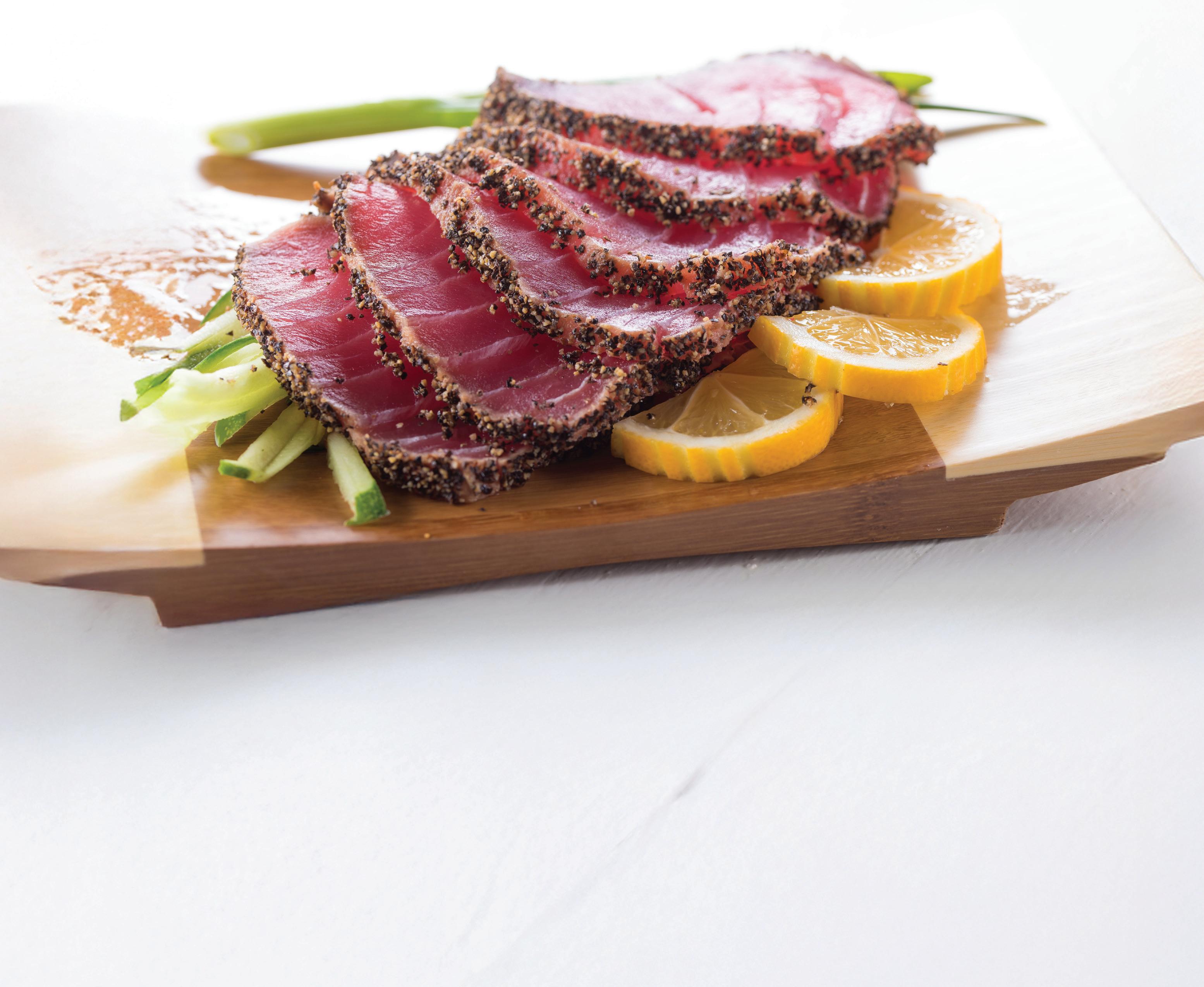
Jewish Star Torah columnists: Rabbi Benny Berlin, spiritual leader of BACH Jewish Center in Long Beach; Rabbi Avi Billet of Anshei Chesed, Boynton Beach, FL, mohel and Five Towns native; Rabbi Binny Freedman, rosh yeshiva of Orayta, Jerusalem; Dr. Alan A. Mazurek, former ZOA chair, retired neurologist, living in Great Neck, Jerusalem and Florida.
Contributing writers: Rabbi Sir Jonathan Sacks zt”l, former chief rabbi of United Hebrew Congregations of British Commonwealth; Rabbi Yossy Goldman, president South African Rabbinical Association; Rabbi Dr. Tzvi Hersh Weinreb, OU executive VP emeritus.
To submit commentary, inquire at: Editor@TheJewishStar.com. Contact our columnists at: Columnist@TheJewishStar.com.
Fri Aug 29 / 5 Elul
Shoftim
Five Towns candles: 7:14 • Havdalah: 8:21
Scarsdale candles: 7:14 • Havdalah: 8:14’
Fri Sept 5 / 12 Elul
Ki Seitzei
Five Towns candles: 7:03 • Havdalah: 8:10
Scarsdale candles: 7:03 • Havdalah: 8:02
Fri Sept 12 / 19 Elul
Ki Savo
Five Towns candles: 6:51 • Havdalah: 7:58
Scarsdale candles: 6:51 • Havdalah: 7:50
Fri Sept 19 / 26 Elul
Nitzavin
Five Towns candles: 6:39 • Havdalah: 7:46
Scarsdale candles: 6:39 • Havdalah: 7:37
Five Towns Candlelighting: From the White Shul, Far Rockaway, NY
Scarsdale Candlelighting: From the Young Israel of Scarsdale, Scarsdale, NY
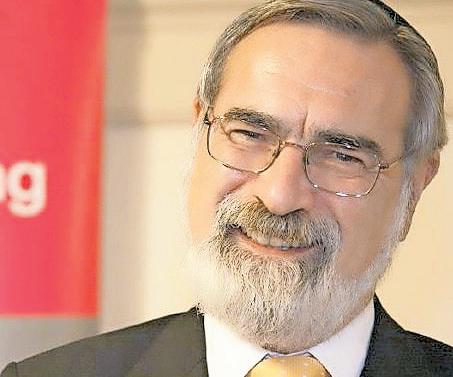
There is a fascinating detail in the passage about the king in Shoftim, this week’s parsha. The text says:
As he presides upon his royal throne, he must inscribe a copy of this Torah for himself upon a scroll, in the presences of the Levitical priests. It must always be with him, and he shall read from it all the days of his life, so that he may learn to revere the L-rd his G-d, taking care to keep all the words of this commandment and these decrees, not considering himself superior to his people, or straying from the commandments to the right or to the left. Then he and his descendants will reign long in the midst of Israel. —Deut. 17:18-20
He must “read it all the days of his life” so that he will be G-d-fearing and never break Torah law. But there is another reason also: so that he will “not begin to feel superior to his brethren” (Kaplan translation), “so that his heart be not haughty over his brothers” (Robert Alter). The king had to have humility. The highest in the land should not feel himself to be the highest in the land.
This is hugely significant in terms of the Jewish understanding of political leadership. There are other commands directed specifically to the king of Israel. He must not accumulate horses so as not to establish trading links with Egypt. He should not have too many wives for “they will lead his heart astray.” He should not accumulate wealth.
These were all standing temptations to a king. As we know, and as the Sages pointed out, it was these three prohibitions that Solomon, wisest of men, broke, marking the beginning of the long slow slide into corruption that marked much of the history of the monarchy in ancient
Understanding the rules of Jewish political leadership.
Israel. It led, after his death, to the division of the kingdom.
But these were symptoms, not the cause. The cause was the feeling on the part of the king that, since he is above the people he is above the law.
As the rabbis said, Solomon justified his breach of these prohibitions by saying:
The only reason that a king may not accumulate wives is that they will lead his heart astray, so I will marry many wives and not let my heart be led astray. And since the only reason not to have many horses is not to establish links with Egypt, I will have many horses but not do business with Egypt.
—Sanhedrin 21b
In both cases he fell into the trap of which the Torah had warned.
Solomon’s wives did lead his heart astray (1 Kings 11:3), and his horses were imported from Egypt (I Kings 10:28-29). The arrogance of power is its downfall. Hubris leads to nemesis.
Hence the Torah’s insistence on humility, not as a mere nicety, a good thing to have, but as essential to the role. The king was to be treated with the highest honor. In Jewish law, only a king may not renounce the honor due to his role. A parent may do so, so may a rav, so may even a nasi, but not a king (Kiddushin 32a-b). Yet there is to be a complete contrast between the external trappings of the king and his inward emotions.
Maimonides is eloquent on the subject:
Just as the Torah grants him [the king] great honor and obliges everyone to revere him, so it commands him to be lowly and empty at heart, as it says, “My heart is empty within me” (Ps. 109:22). Nor should he treat Israel with overbearing haughtiness, for it says, “So that his heart be not haughty over his brothers” (Deut. 17:20). He should be gracious and merciful to the small and the great, involving himself in their good and welfare. He should protect the honor of even the humblest of men. When he speaks to the people as a community, he should speak gently, as it says, “Listen my brothers and my people…” (I Chronicles 28:2), and similarly, “If today you will be a servant to these people…” (I Kings 12:7). He should always conduct himself with great humility. There was none greater than Moses, our teacher. Yet he said: “What are we? Your complaints are not against us” (Ex. 16:8). He should bear the nation’s difficulties, burdens,
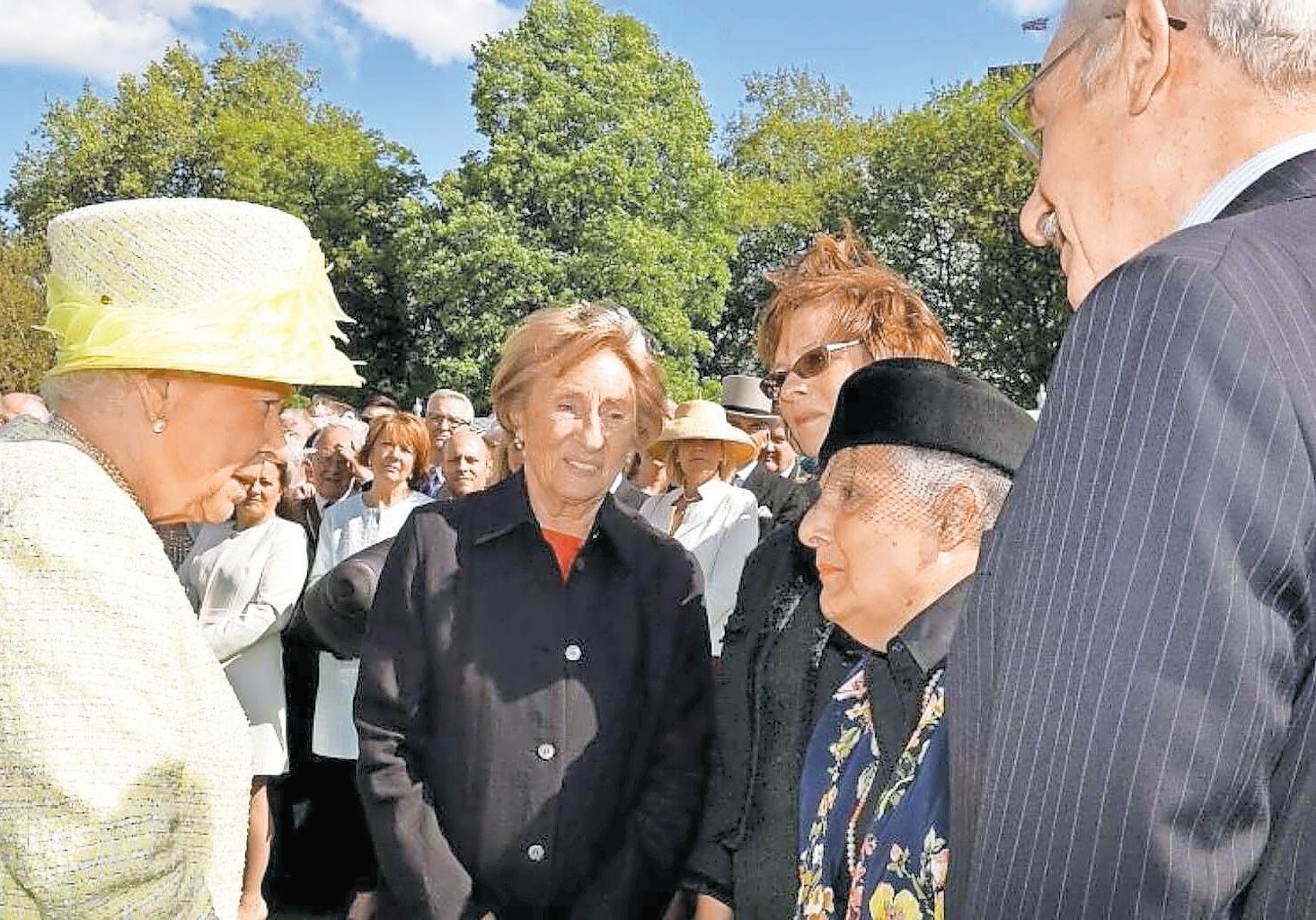
complaints and anger as a nurse carries an infant. —Maimonides, Laws of Kings 2:6
The role-model is Moses, described in the Torah as “very humble, more so than any person on the face of the earth” (Num. 12:3). “Humble” here does not mean diffident, meek, self-abasing, timid, bashful, demure, or lacking in self-confidence. Moses was none of these. It means honoring others and regarding them as important, no less important than you are. It does not mean holding yourself low; it means holding other people high. It means roughly what Ben Zoma meant when he said (Avot 4:1), “Who is honored? One who honors others.”
This led to one of the great rabbinic teachings, contained in the siddur and said on Motzei Shabbat: Rabbi Yochanan said, “Wherever you find the greatness of the Holy One, blessed be He, there you find His humility.” This is written in the Torah, repeated in the Prophets, and stated a third time in the Writings. It is written in the Torah: “For the L-rd your G-d is G-d of Gods and L-rd of Lords, the great, mighty and awe-inspiring G-d,
who shows no favoritism and accepts no bribe.” —Deut. 10:17
Immediately afterwards, as Megillah (31a) notes, we read that G-d, “upholds the cause of the orphan and widow, and loves the stranger, giving him food and clothing…” (Deuteronomy 10:18). G-d cares for all regardless of rank, and so must we, even a king, especially a king. Greatness is humility.
In the context of the Diamond Jubilee of Queen Elizabeth II, there is a story worth telling. It happened in St James’ Palace on 27 January 2005.
As Chief Rabbi, I was invited to join a group of Holocaust survivors, and together we marked the sixtieth anniversary of the liberation of Auschwitz.
Punctuality, said Louis XVIII of France, is the politeness of kings. Royalty arrives on time and leaves on time. So it is with the Queen, but not on this occasion. When the time came for her to leave, she stayed. And stayed. One of her attendants said he had never known her to linger so long after her scheduled departure time.
The Queen gave each survivor — it was a large group — her focused, unhurried attention. She stood with
each until they had finished telling their personal story. One after another, the survivors were coming to me in a kind of trance, saying, “Sixty years ago I did not know whether I would be alive tomorrow, and here I am today talking to the Queen.”
It brought a kind of blessed closure into deeply lacerated lives. Sixty years earlier they had been treated, in Germany, Austria, Poland, in fact in most of Europe, as subhuman, yet now the Queen was treating them as if each were a visiting Head of State. That was humility: not holding yourself low but holding others high. And where you find humility, there you find greatness.
It is a lesson for each of us. Rabbi Shlomo of Karlin said, “Der grester yester hora is az mir fargest az mi is ein ben melech, (The greatest source of sin is to forget we are children of the king).” We say Avinu Malkeinu, “Our Father, our King.” It follows that we are all members of a royal family and must act as if we are. And the mark of royalty is humility. The real honor is not the honor we receive but the honor we give.
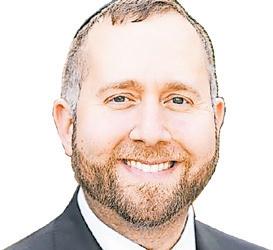
When I think back to the Jewish month of Elul in high school, the experience feels so different from how I live it now. Back then, my service of Hashem was shaped by black-and-white thinking. Either I focused on every single word in prayer, or I considered the whole tefillah a failure.
Growth, to me, meant starting over from scratch. With time and maturity, I’ve come to
realize something deeper: renewal does not always mean a complete restart. The Torah’s concept of chadash, newness, is not creation from nothing. It can mean renovation, redirection, or uncovering potential already present. This shift reframes Elul: it is not about erasing who we have been, but about refining who we are and directing our lives toward higher purpose. Picture the battlefield. The soldiers are lined up, weapons in hand, hearts pounding. The war is about to begin. And then, unexpectedly, one soldier is pulled aside. He is told not to fight, but to go home. Why? Because he has just built a new house, and the Torah in this week parsha, Shoftim, exempts him until he inaugurates it.
At first glance, this law seems straightfor-
ward. A “new house” is one that never existed before. But the Mishnah in Sotah (43a) raises a question: what about someone who renovates an existing house, adding a new wing, expanding the structure, or extensively refurbishing it? Rabbi Yehudah rules that such a person must still go to war. For him, the house remains the same in essence. Only something entirely new qualifies as chadash
The Rambam, however, in his Perush HaMishnayos rules differently. He holds that even significant renovations render a house halachically new, exempting the owner from battle. This is surprising, since the Mishnah itself only records Rabbi Yehudah’s opinion, usually signaling that this is the accepted view. Why does the
Could we truly rebuild ourselves from scratch?
Rambam broaden the definition of chadash?
The Ben Ish Chai offers a key. To understand a Torah term, he suggests, trace its very first appearance in Tanach. The word chadash first appears in Shemos 1:8: “A new king arose over Egypt who did not know Yosef.”
The Gemara in Sotah (11a) debates what “new” means. Rav says it was literally a different Pharaoh. Shmuel insists it was the

Since the days of Moses, Jews have had their own unique judicial system. We’ve had a practicing judiciary long before other societies.
Halachah covers not only ritual but also legal, financial and marital issues. That’s why, according to our tradition, it is forbidden to go to secular, non-Jewish courts when dealing with a fellow Jew.
Why would we require non-Jewish courts when our own Torah has all the answers? To go elsewhere is an insult to our own wide-ranging, impressive traditional judicial system.
So, if two Jews have a financial dispute or some type of altercation, they should not approach the secular courts, but rather put their case before the beit din or before a qualified rabbi.
If it’s between us, we should keep it between us. It is considered an affront to G-d and His Torah if we demonstrate that we cannot find resolution in our own legal system and need to seek justice in non-Jewish courts.
We all know there are 613 biblical commandments in the Torah, but did you know that there

are also seven rabbinical commandments?
These are lighting Shabbat candles; reciting blessings; observing Chanukah and Purim; reciting Hallel; washing our hands before meals; and
following the rules of carrying items on Shabbat within an eruv.
When performing the above commandments, we recite a blessing. These blessings are the same formula and language used when observing biblical commandments. We say, in Hebrew: “Asher kidishanu b’mitzvotav vtzivanu… (Blessed are You, Lord our G-d, King of the Universe who has sanctified us with His commandments and commanded us to…)”
Really? But G-d didn’t command us to perform these seven commandments. It was the rabbis, not G-d. So how then can we say that G-d has commanded us when it is, in fact, a rabbinic commandment?

As a Torah observant Jew, I am aware that Hashem has given us a guide — the Holy Torah — in every facet of our lives. This is why the application of Torah law is called halacha, which literally means to walk in the ways of Hashem.
To be sure, the interpretation of the many complex facets of halacha make up whole libraries of thought and discussion, from the Mishna and Talmud to the many commentaries and responsa of Rishonim and Achronim and a whole litany of poskim that include your local rabbi. But the salient point is that halacha
deals with everything that entails being a functional Jewish human being.
So it is reasonable to believe that halacha has given us guidance on how a Jewish nation should engage in something as consequential as war.
We have been in the current war for almost two years, and Israel is poised to embark on a major new campaign. It is not surprising that this week’s Torah portion, Shoftim, gives us very precise instructions on how to conduct a war — what is permitted and what isn’t. And while the commentators and poskim may differ on some of the minutia, there’s a very clear principle that ein mikra yotze midei peshuto (a verse cannot escape its simple interpretation). So let us look at the appropriate pesukim involved in this important, albeit very regrettable, activity, that of engaging in war.
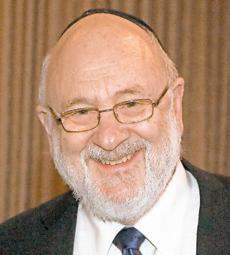
Ibegin this column with two distinct goals. On the one hand, I want to familiarize you with the complexity of a brief verse in this week’s Torah portion, Shoftim; on the other hand, my second goal is to introduce you to the use a rabbi made of a verse in a sermon to his Brooklyn congregation long ago.
I refer to chapter 18, verse 13, five words long in Hebrew: “Tamim tihyeh im HaShem Elokecha. How to translate this significant teaching, par-
ticularly the word tamim, has tantalized experts throughout the ages and across the spectrum of Bible readers. Here are some sample translations:
•First, two Jewish samples. One reads, “You must be wholehearted with the L-rd your G-d.”
Another reads, “You must be wholly loyal to the L-rd your G-d.”
•A standard but non-Jewish translation renders it, “You shall be blameless before the L-rd your G-d.”
My preferred translation, although admittedly not perfect, is that of Rabbi JH Hertz, former chief rabbi of the British Empire: “Thou shalt be whole-hearted with the L-rd your G-d.”
His translation differs slightly from the first Jewish sample quoted above. Note especially that besides the use of the archaic “Thou shalt” and
Shoftim states, in sefer Devarim 20:10, that “when you draw near to a city to wage war against it, you shall call out to it for peace.” We are dealing now with a milchemet reshut, which can be translated as a war of authority or permission to wage war by virtue of royal or judicial authority, not a war of defense, where Israel has been attacked. Had that been the case, Israel would not be suing for peace, it would be commanded to defend itself and the Land of Israel, the very definition of a milchemet mitzvah, a war of commandment from the Torah.
This verse speaks clearly of a battle where your first obligation as a nation is to offer the other nation peace — “v’karata eleha l’shalom (call out to it for peace).” Only when this offer of peace is refused may you wage war to its fullest extent.
How much more so therefore, in a
‘Those who are merciful to the cruel, will be cruel to the merciful.’
milchemet mitzvah, a war of self-defense, a war when you’ve been attacked? October 7 triggered such a war. The Torah says clearly, “v’tzarta aleha (you shall besiege it).” No humanitarian corridors or aid.
Rashi explains quite clearly, “you may deprive them of food, water and even subject them to mortal diseases.” The Torah continues: “Every male shall be smitten by the blade of the sword.” The women, children, animalsn — everything in the city — can be
the hyphen in “whole-hearted,” Rabbi Hertz correctly insists upon “with the L-rd” rather than “to the L-rd,” indicating companionship with the L-rd rather than subservience to Him.
Rabbi Hertz provides us an additional benefit. He includes in his notes the comments of Rashi on this verse: “Walk with him whole-heartedly and hope in Him. Pry not into the veiled future but accept whatever befalls you. Then you will be His people and His portion.”
There is a subtle, but fundamental, difference between the translations just presented and Rashi’s conception of the meaning of the verse. The issue at hand is the meaning of the word tamim, a word which has had a colorful history. In modern Hebrew usage, the words tam or tamim or temimut imply simplemindedness, in-
‘What gives,’ they ask.
nocence bordering upon ignorance, or perhaps naïveté. One well known example of this usage is the third son, the tam, in the Passover Haggadah who comes across as a simpleton who can only utter, “Mah zot? (What’s going on?)”
Another example is the term used by the Talmud to describe an ox that’s been deemed harmless. It is therefore labeled a tam, a naïvely innocent creature.
Many assert that Rashi is defining tamim in this sense. He wisely locates our verse in its context in the preceding verses, 9-12. There we find
Published weekly except during certain religious and civil holidays by The Jewish Star LLC New York City office: 5676 Riverdale Ave Suite 311, Bronx NY 10471 • LI office: 2 Endo Blvd, Garden City NY 11530 Here’s how to reach The Jewish Star — Write: Editor@TheJewishStar.com. Call: 516-622-7461 ext 291
Editor & Publisher: Ed Weintrob
516-622-7461 ext 291
Jewish Star Associate: Nechama Bluth
516-622-7461 ext 241
Content: The Publisher endeavors to ensure that our content is within the bounds of normative halachah and hashkafah. Anyone who feels anything we publish may be inappropriate in this regard is urged to bring the item in question to the attention of the Publisher.
Advertising is accepted at the sole discretion of the Publisher and should conform to standards appropriate for distribution in an Orthodox community. Send us your news! Editor@TheJewishStar.com
Advertising: Publisher@TheJewishStar.com
Kashrut: The Jewish Star is not responsible for the
kashrut of any product or establishment featured in its pages. If you have questions regarding any establishment or product, including its supervision, please consult your rabbi for guidance.
Submissions: All submissions become the property of The Jewish Star and may be edited and used by the Publisher, its licensees and affiliates, in print, on the web and/or in any media that now exists or will exist in the future in any form, including derivative works, throughout the world in perpetuity, without additional authorization or compensation. The individual or entity submitting material affirms that it holds the copyright or otherwise has the right to authorize its use in accordance with The Jewish Star’s terms for submissions.
Opinions: Views expressed by columnists and other writers do not necessarily reflect the position of the Publisher or of The Jewish Star LLC.
Distribution: The Jewish Star is available free in kosher food establishments, stores, synagogues, and curb-side newsboxes on Long Island, in New York City and elsewhere. To request free delivery to your location, write Publisher@TheJewishStar.com.
Copyright: All content is copyright and may not be republished or otherwise reproduced without written permission by The Jewish Star; to do so without permission is against the law and halacha. For content reproduction write to Publisher@TheJewishStar.com.
The Jewish Star subscribes to JNS. It, or its contributors, own the copyrights on material attributed to them. The length and content of JNS material and all other submitted material may be edited by The Jewish Star.
Member: American Jewish Press Association. This newspaper contains words of Torah. While it is not considered shaimos, please dispose properly.
Mitchell Bard, foreign policy analyst, authority on USIsreal relations; Ben Cohen, senior analyst, Foundation for Defense of Democracies; Stephen Flatow, president, Religious Zionists of America-Mizrachi and father of Alisa Flatow, murdered in an Iranian-sponsored Palestinian terrorist attack in 1995; Yisrael Medad, Americanborn Israeli journalist and political commentator; Rafael Medoff, founding director of David S. Wyman Institute for Holocaust Studies; Fiamma Nirenstein, Italian-Israeli journalist, author of 13 books, leading voice on Israeli affairs, Middle Eastern politics and antisemitism; Melanie Phillips, British journalist; Moshe Phillips, national chairman, Americans for a Safe Israel; Thane Rosenbaum, Distinguished University Professor at Touro University (published by Jewish Journal); Jonathan S. Tobin, editor-in-chief, Jewish News Syndicate.
Distinguished University Professor Touro College
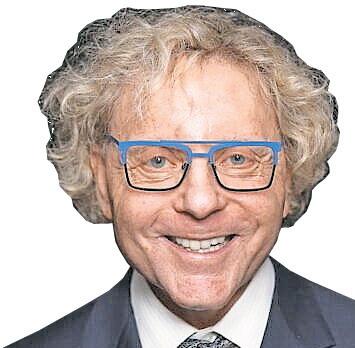
Sometimes a coincidence becomes kismet — like my recently published book “Beyond Proportionality: Israel’s Just War in Gaza,” and Roman Polanski’s film “An Officer and a Spy,” released six years ago in France as “J’Accuse” but which has only now made it to America, completing a two-week run at the Film Forum in Manhattan.
Both the movie, and the opening paragraphs of my book, recall the tragic fate of a Jewish military officer accused of a crime he did not commit — and its cosmic relevance today, given the equally depraved indictments against the Jewish state.
Whether the film will be more widely in the United States or made available on digital platforms is still unknown. Back in 2019 when the film premiered, the César Awards (the French Oscars) and the European Film Awards showered it with praise — but not without public controversy.
Polanski, too, faced the career-shattering consequences of #MeToo, another example of personal misconduct — in some cases merely alleged — forever tarnishing once-treasured artistic achievements.
Polanski’s life, as a child survivor of the Holocaust, had been grotesquely upended once more when his wife and unborn child were murdered by the Manson Family in a 1969 Los Angeles home invasion. In 1977, Polanski was arrested for statutory rape of a 13-year-old. He fled the United States for Europe when a judge planned to ignore a plea deal and sentence Polanski to decades in prison. He is today, at 92, still a fugitive from American justice.
And that’s why cinephiles may never see “An Officer and a Spy.” Cancel culture remains very much in business. His art sabotaged by a scan-
Where are the men and women of courage and moral clarity, like Émile Zola?
dal unrelated to its creation. Missing out on this film, however, is a shame — and not one without contemporary relevance.
Polanski is a singular talent. “Chinatown,” “Rosemary’s Baby” and “Tess” are among his directorial credits. Perhaps more so than with “The Pianist,” his acclaimed Holocaust film, “An Officer and a Spy” is, for him, an even more personal movie.
Without overt embellishments, “An Officer and a Spy” speaks directly to Polanski’s often obscured Jewish ancestry. It casts a light onto an epochal antisemitic moment in world history, one not unlike what we are witnessing today. The infamous Dreyfus Affair, which took place in France from 1894 to 1906, radiated Jew-hatred around the Western world — especially among artists, students, and the impolite company of the allegedly refined.
Sound familiar?
The world’s hysteria-fueled reaction to Israel’s war in Gaza — fought in self-defense, against terrorists who refuse to surrender or return hostages while continuing to target Israeli civilians and use their own as human shields (war crimes that go blithely unnoticed), has granted a license to malign Israel and attack Jews wherever they might be.
Alfred Dreyfus, a captain on the French Army’s General Staff, was framed as having sold state secrets to a German military attaché. The evidence against him was preposterous. Nonetheless he was convicted as a traitor, stripped of his rank and shipped off to a prison on Devil’s Island to serve a life sentence. Headlines of a treasonous Jew sparked waves of antisemitic fervor worldwide.
A high-ranking officer in the French military, Georges Picquart, newly appointed as chief of intelligence, took a fresh look at the evidence against Dreyfus only to discover its relative nonexistence. The military had settled on Dreyfus not because of his guilt but because, as a Jew, he was an easy target.
Picquart further discovered that confining Dreyfus to Devil’s Island did nothing to arrest Germany’s espionage against the French. The real traitor was still loose among France’s military ranks. When Picquart found him, however, his superiors refused to admit their error. The surge of antisemitism kept everyone occupied. Why ruin a good thing?
Lieutenant Colonel Picquart was no natural friend of Jews, or especially fond of Dreyfus, who was once one of his students at the military
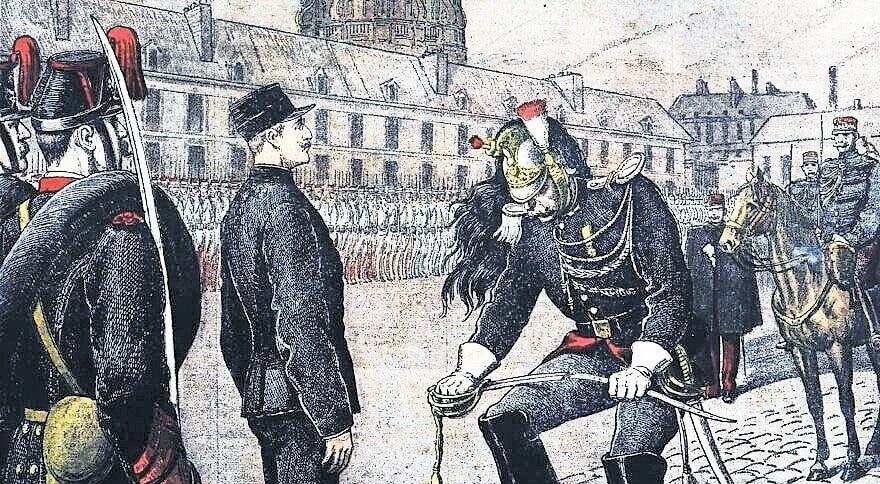
academy. But Picquart was a man of conscience. He joined a small group of patriots who believed in Dreyfus’ innocence, among whom was France’s leading public intellectual, Émile Zola.
Zola penned a front-page essay, “J’Accuse,” in France’s leading newspaper, exposing the military’s corruption and cover-up.
The French military refused to buckle. Zola was successfully prosecuted for libel and fled to England. Picquart, who testified for Zola, was sentenced to prison for insubordination. Dreyfus was returned to Paris for a re-trial, only to be convicted all over again.
As with most miscarriages of justice, truth ultimately prevails. The French military command resigned in disgrace. Dreyfus was exonerated, promoted to lieutenant colonel and served in World War I. Picquart was appointed Minister of War. Zola, however, the most pivotal of Dreyfus’ champions, died under suspicious circumstances soon after leaving France.
In “An Officer and a Spy,” Polanski focuses his lens almost entirely on the principled stand and selfless risk undertaken by Picquart. The film strays from earlier biopics that handed out heroism more even-handedly, such as “The Life of Emile Zola” (1937), and the HBO movie “Prisoner of Honor” (1991) (starring Richard Dreyfuss, as Picquart).
Ironically, the father of Zionism, Theodor Herzl, was in Paris reporting on the trials for an
Austrian newspaper. So shaken was he by the outrageous railroading of a Jew and the tumultuous rioting that followed, it convinced him of the urgency for a Jewish homeland. The Dreyfus Affair foreshadowed greater calamities to come — the Holocaust, for instance — and inspired Herzl to publish “The State of the Jews,” in 1896. Today, that state, which became Israel in 1948, is being subjected to global lies as malignant as the one that animated the Dreyfus Affair: The Jewish captain was not a spy; and the Jewish state is committing neither genocide nor mass starvation.
I begin “Beyond Proportionality” with the Dreyfus Affair because it is unmistakably reminiscent of the heady and heated Jew-hatred we are experiencing today.
The commonalities are stark: Rageful mania on campuses and city streets. Desecration of Jewish landmarks and businesses. Violence against Jews far from the events in Gaza. Blatant lying and covering up evidence of Hamas’ barbarism, its flouting of the laws of war, the complicity of bad actors, like the United Nations and mainstream media, and the deliberate discounting of Israel’s manifold efforts to preserve Palestinian life.
“An Officer and a Spy” was completed long before the massacre on October 7, 2023, and its scandalous aftermath. One doubts that Polanski
Rosenbaum on page 23

Over the years, I must have read tens of thousands of pages devoted to the topic of antisemitism, and I’ve yet to find a better explanation for its persistence across the centuries than this one:
Everything seems impossible or terribly difficult without the providential appearance of antisemitism. It enables everything to be arranged, smoothed over and simplified. If one were not an antisemite through patriotism, one would become one through a simple sense of opportunity.
The author of those words was himself an antisemite — Charles Maurras, a 19th- and early 20th-century French Catholic monarchist. Maurras founded the Action Française movement and became one of the more visible tormentors of Alfred Dreyfus, the French Jewish army officer falsely convicted of espionage in 1894, following a trial driven by the burning antisemitism inside the courtroom and on the streets outside.
Maurras’ legacy is deeply relevant to the character of antisemitism today. For one thing, we live in an age that distrusts complexity and nuance,
The gallery of fools, morons and haters we have to contend with aren’t as dumb as they make themselves out to be.
reaching for utopian solutions because “compromise” is a dirty word. The profound shift from traditional media to an endless stream of personality-driven, no-holds-barred posts, videos and talk shows has rewarded the loudly ignorant.
As is always the case in the early stages of a cultural transformation, the participants revel in their ability to finally say what was previously unsayable. When it comes to Jews, nothing escapes their vengeful scrutiny — not Israel’s right to exist, not the Holocaust, not the emotional and political support for Israel among Jewish communities outside the Jewish state.
Then there is Maurras’ well-observed and cynical point about opportunity. The gallery of fools and morons we have to contend with — among them political commentator Candace Owens, for Fox News cable-TV host Tucker Carlson, English broadcaster Piers Morgan and their ludicrous guests — aren’t so dumb as to have not sniffed out an opportunity here. The receptiveness to antisemitism that remains stubbornly embedded within non-Jewish societies has been skillfully exploited by this crowd for commercial gain and brand exposure, now reaching the point where we need to stop seeing them as critics to respond to and start seeing them as enemies to defeat.
Most importantly of all, Maurras functions as a precursor to the antisemitism we are confronting today. It doesn’t really matter that none of these people will have heard of him. Even if they don’t realize it, they have picked up on the trend he pioneered.
While Maurras was a supporter of the collaborationist Vichy regime who was imprisoned in France after World War II, his antisemitism was not the Nazi kind, obsessed with pseudoscientific “racial” categories. Rather, Maurras was a political antisemite.
For him, post-revolutionary France had abandoned the noble moorings of French governance
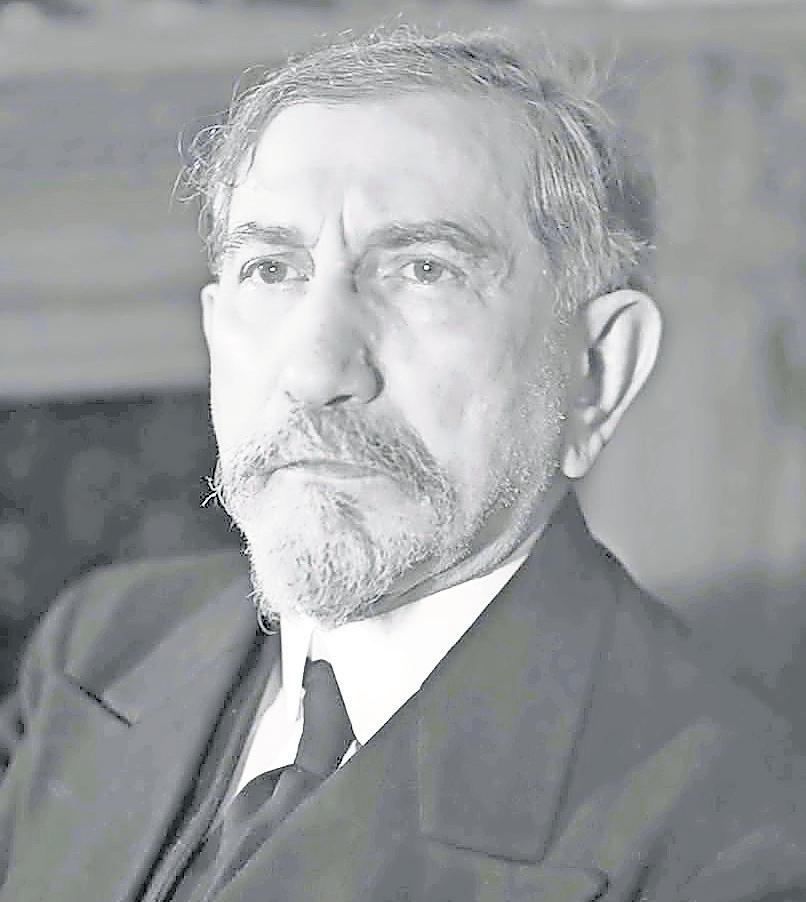

in favor of an alien republic serving Protestants, Freemasons and, above all, Jews. An early advocate of the “dual-loyalty” conspiracy theory, Maurras regarded French and Jewish interests as diametrically opposed, making the Jew the natural enemy of France.
This trope, which flies in the face of the empirical evidence of Jewish soldiers, Jewish diplomats and Jewish politicians loyally serving the countries of which they are citizens, has been eagerly grasped by parts of today’s American right, as well as most of the left. Which brings me, unfortunately, to the subject of Rep. Marjorie Taylor Greene (R-Ga.).
Her interview last week with the former Fox News host Megyn Kelly was a truly grotesque spectacle. Kelly, who made sure to refer to her “Jewish friends” as often as possible as she de-
livered her dog-whistle questions, cooed sympathetically as the simpleton seated across from her delivered answers in a language approximating English.
Whether Taylor Greene really believes the nonsense she spouts or whether she consciously lies is not a question that can be answered. Either way, her potpourri of falsehoods, stereotypes and innuendos went unchallenged — not because Kelly can’t afford a researcher, but because she wants, through the medium of an interview, to promote Taylor Greene’s campaign to tar American Jews as disloyal to their republic.
All the predictable topics came into the spotlight. On aid to Israel, Taylor Greene whined that the $3.8 billion provided annually by the United States was robbing ordinary Ameri-
See Cohen on page 23
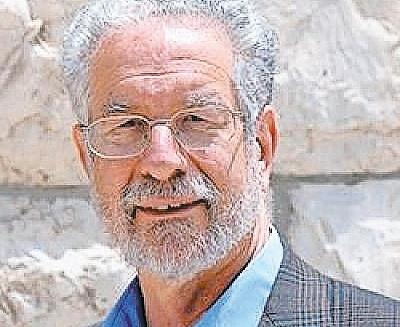
In an essay published in Tablet magazine in early July, Jacob Howland was insistent that “Israel epitomizes not only the abundant fruits of Western civilization but also the conditions for their existence: strong borders, national pride and free markets; thick social bonds and vigorous common purpose.”
Those conditions, he concluded, are the fundamental political, cultural and economic essentials that would “impede any sort of political or religious globalization, be it of socialism, Islamism or elite technocratic rule.”
Furthermore, to his mind, the anti-Zionism we are witnessing — with a demand to cleanse Jews from their homeland, to be replaced by a Palestine “from the river to the sea” but with the accompanying call to “globalize the intifada” — indicates that the protesters are being motivated also by a desire “to eradicate Western civilization.”
A professor of philosophy and dean of intellectual foundations at the University of Austin in Texas who previously lectured at the University of Tulsa in Oklahoma, Howland argues
‘Take the violinists from the orchestra ... and the orchestra is at a loss.’
— Ze’ev Jabotinsky
that the best way for humans to realize their potential and achieve a safe, secure and a free life for themselves and families, while also making positive contributions to society and global communities, is to promote nationalism. This is opposed to forms of globalization, which stultify and oppress.
In this approach to on nationalism, I see a rough reiteration of the thinking of Ze’ev Jabotinsky, the Russian-born founder of the Revisionist Zionist movement, and so will take advantage of Howland’s lead-in.
In a 1913 article titled “Race,” Jabotinsky proposed the term “national psyche” (which his ideological opponents quickly refashioned as a racial outlook, whereas Jabotinsky, the liberal, rejected racism while searching for additional nomenclature).
(Incidentally, in an Aug. 4 ruling by Judge Trevor McFadden of the US District Court for the District of Columbia, in which he stated that “The Star of David … symbolizes the Jewish race,” he included such terms as “national consciousness,” “national essence” and “national affinity” to highlight the uniqueness of each nation and its soul, noting that he was not fixated on “race.”)
For Jabotinsky, “national culture is the sum total of all the habits, institutions and ways of living of the nation.”
Nations, he insisted, are different from one another; each makes a parallel but distinct contribution based on its lived experience.
As he explains:
A thing that one nation borrows from another is not exactly the same one. In each nation, the borrowed thing takes on a different form. For example, the same parliamentary system which has a unique characteristic in England has an entirely different characteristic in Spain or France. This

does not mean that the thing is “better” in one nation and ‘worse’ in another, but it is nevertheless different.
And so, in seeking to justify why certain nations must be based in their home territory, he penned: Territory, language, religion, common history — all these are not the essence of a nation but its adjectives only. Indeed, these adjectives are of great importance, and their importance is even greater for the stability of national existence. But the essence of a nation — its first and last fortress of uniqueness of its image — is its distinctive physical characteristics, the compound of its racial [sic] recipe.
In fact, seeking to explain why nations attack nations, Jabotinsky did not point to an unalterable “racial character” as the guilty element but wrote: “When one nation attacks its
neighbor to lust and pillage, the origin of this urge is not to be found in its national qualities, but in its economic appetite.”
In other words, Jabotinsky, who studied under Socialists in his university days in Rome — attending the lectures of Antonio Labriola, Italy’s first Marxist academician, Benedetto Croce and Enrico Ferri — was not unsympathetic to socialism. His above emphasis on economic motivation as a cause for aggression could be a hesitant non-rejection of a Marxist rationale at work.
His relationship with Marxism is already visible in a 1903 essay in which he wrote: The fact is that the question of nationalities has not yet been worked out scientifically, especially from the point of view of historical materialism. I do not assert, but I will not be surprised if
See Medad: How Zionism on page 22
RaBBi
aVi weiSS
Hebrew Institute of Riverdale
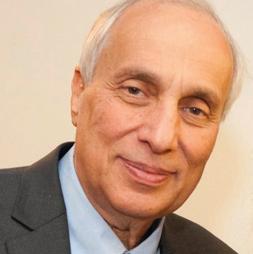
n today’s media, “hits” are the metric of success. The more clicks, the more powerful the piece.
By that measure, the New York Times’ July 24 front-page photo of Mohammed al-Mutawaq — presented as a starving Gazan child under the headline “Young, Old and Sick Starve to Death in Gaza: There Is Nothing” — was a triumph. It drew massive attention. Mohammed became the face of the false allegation that Israel is purposefully starving Palestinian children, sparking an avalanche of criticism against the Jewish state.
But five days later, the paper quietly issued a correction: Mohammed had “pre-existing health problems.” The correction received only a fraction of the clicks.
This cycle of false news is relentless.
The BBC ran a report with the headline, “Gazan woman flown to Italy dies of malnutrition.”
After an avalanche of criticism, it quietly amended the story to note that she had, in fact, died of cancer. Once again, reporters failed in their due diligence, and once again, the correction drew only a fraction of the attention given to the origi-
I speak from personal experience. Slander, once loosed, is nearly impossible to fully retrieve.
nal libel. These disparities underscore a sobering truth.
The legal bar for proving libel is high and rightly so. But news outlets should adopt a simple principle: Corrections should appear with the same prominence as the original story, on the same page and in the same medium. Only then is there a real chance to right a wrong.
Ihave learned personally that serious damage from false reporting is rarely undone. I experienced this after the first World Trade Center bombing on Feb. 26, 1993. I led a small group to protest outside the Al-Salaam Mosque in Jersey City, where Sheik Omar Abdel-Rahman — the “Blind Sheik” and spiritual leader of the terrorists — had preached.
Standing before the media, I said: “I am not here demanding this mosque be closed. I respect all religions and their houses of worship. I am here to protest its leadership for allowing a religious leader who preaches hate and jihad to speak.”
The next day, the Times quoted me as saying I was demanding that the mosque be closed. The misquote ignited a firestorm, including an op-ed by a prominent columnist in the Forward comparing me to Aysha Salameh, the mother of Mohammed Salameh, the first person indicted in the 1993 bombing of the World Trade Center. The columnist argued that as Aysha Salameh blamed all Jews for the World Trade Center attack, I blamed all Muslims.
That charge cut deeply. I had always distinguished between extremists and the broader Muslim community, reaching out to Muslim leaders with respect and love.
Three weeks later, buried on Page 2, came the correction: “An article on March 8 … omitted a word in quoting Rabbi Avi Weiss … at a demonstration outside the Al-Salaam Mosque in Jersey City. He said, ‘I am not here to condemn this place and this mosque’.” The single word not

was italicized. As David Bar-Ilan, then-editor of the Jerusalem Post, in his “Eye on the Media” column wryly observed, “What’s one word between friends?”
It wasn’t my only encounter with this pattern.
During the Crown Heights riots in the early 1990s, the Times falsely reported that I had accused then-Mayor David Dinkins of murder. A few years later, during a protest against the Auschwitz convent, they claimed that I had physically fought local Poles. In both cases, retractions came — buried, belated and largely unseen.
These personal episodes pale, absolutely pale, in comparison to false reporting that maligns an entire country. But they gave me a taste of how devastating — and enduring — such errors can be.
The great 20th-century rabbinic sage, the
Chafetz Chaim, told of a man seeking forgiveness for gossip. The rabbi tore open a feather pillow from his second-floor window and let the feathers scatter. “Now,” he said. “Go collect them.” His point was clear: Slander, once loosed, is nearly impossible to fully retrieve.
The Talmud cautions, “Wise ones, be careful with your words.”
Today’s reporters and editors would do well to take that to heart before putting pen to paper or voice to broadcast. The truth deserves not only to be told, but to be corrected with equal force when it is wronged.
Avi Weiss, a rabbi, theologian and author, is a longtime activist for Jewish causes and human rights. His new book, “Defending Holocaust Memory,” is scheduled for publication this fall.
Write: Columnist@TheJewishStar.com

When it comes to the Gaza Strip, public headlines too often flatten human tragedy into slogans: “genocide,” “famine,” “ethnic cleansing.”
Recent articles have argued, on the basis of spreadsheets and calorie charts, that Israel is guilty of deliberately starving Gazans into submission. Their starting point? A comparison between the number of trucks Israel allows in and some estimate of how many calories an average Gazan requires.
But hunger isn’t a spreadsheet. If the analysis stops at calories-in versus mouths-to-feed, it misses the messy reality on the ground: Hamas propaganda, food theft, internal corruption, logistical chaos, and the tragic use of both Gazan civilians and Israeli hostages as pawns in a cruel game.
The leap from calorie spreadsheets to accusations of genocide ignores several critical problems:
•Miscalculations: While deliveries fluctuated, the number of aid trucks never fell below
If Hamas were to capitulate, release its hostages and end its hoarding of food, Gaza’s hunger would be relieved.
about 100 per day, which, by Israel’s Coordination of Government Activities in the Territories (COGAT), meets or exceeds the basic caloric needs of the population. According to the official website, from Oct. 7, 2023, the day of the massacre, until today (mid-August 2025), 100,000-plus trucks were delivered with more than 1.5 million tons of food.
•Aid Diversion: UN tracking between May and August 2025 shows that nearly 87% of aid trucks never reached intended civilians, with the overwhelming majority intercepted by Hamas or its affiliates. Very little of this diverted aid is redistributed fairly to the population.
•Hamas Targeting of US-Israel Distribution: Even when Israel and the United States set up direct distribution mechanisms to bypass Hamas, these convoys and warehouses were deliberately attacked. Aid workers were injured and sites targeted — clear evidence that Hamas seeks to prevent food from reaching civilians if it undermines their control.
•Prices versus hunger: Reports point to rising food prices as “proof” of famine. But prices rise not only from scarcity. In a war economy, theft, hoarding and selective distribution can create artificial shortages. Testimonies from Gazan merchants and even Mahmoud Abbas himself note that Hamas routinely skims 15% to 25% of incoming goods for profit, taxing or outright seizing food. That alone is enough to create inflation and deprivation, regardless of Israel’s supply.
•Suspiciously wrong predictions: UNaffiliated bodies forecast widespread starvation deaths in spring 2024. Yet by mid-year, the actual number of reported deaths from malnutrition in Gaza remained comparable to baseline mortality in Egypt or Jordan. That discrepancy should give pause before accepting famine proclamations at face value.

Palestinian carries humanitarian aid in Rafah, in the southern Gaza Strip, on Aug. 14. Abed Rahim Khatib, Flash90
Hamas has mastered the art of staging suffering. The group films hungry children, long bread lines, and crying mothers, pushing these images into global news cycles. That does not mean suffering isn’t real. It means that the suffering is weaponized. To dismiss this as “secondary” is to ignore a central pillar of Hamas’s strategy. The group benefits politically every time hunger headlines run worldwide.
The deeper tragedy is that this propaganda works because Hamas itself creates conditions for hunger — by seizing convoys, storing food in tunnels, or rewarding loyalists with access to aid. No amount of spreadsheet analysis can explain why sacks of flour end up in Hamas depots while UN trucks are looted.
Under international law, responsibility for preventing famine in Gaza does not rest on Israel alone. Article 23 of the Fourth Geneva Convention (1949) obligates parties to allow the free passage of food and medicines for civilians, but Article 55 places the primary duty on the power in effective control of the territory to ensure adequate supplies — in this case, Hamas as the de facto governing authority.
Egypt, too, shares responsibility since the Rafah border crossing is an internationally recognized relief channel.
Crucially, Hamas not only diverts and taxes aid but also prevents evacuation to safer zones, and together with Egypt and other
See Dubnov on page 23
JonAtHAn S. tobin
JnS Editor-in-Chief

It’s back in fashion. If Palestinian statehood were a stock, its price would be soaring.
In the past several weeks, France, Britain, Canada and Australia have all said that they will recognize a Palestinian state next month at the annual meeting of the UN General Assembly. That’s on top of the 147 UN member states that already recognize the state of “Palestine.”
None of them seems to think there’s something wrong with rewarding Palestinians with statehood after the Hamas-led terrorist attacks on southern Israeli communities on Oct. 7, 2023. Indeed, that orgy of mass murder, rape, torture, kidnapping and wanton destruction seems to have fulfilled the hopes of Hamas terrorists by leading to a revival in interest in the scheme around the globe.
The issue had gone stale for many years. But a new spate of terrorism has suddenly made it quite popular.
A lot of Americans agree with the idea. According to a Reuters/IPSOS poll published this week, 58% of adult Americans favored recognition of a Palestinian state. That figure largely hinges on party affiliation, with 78% of Democrats agreeing, while only 41% of Republicans favor such recognition.
Interestingly, the question was paired with another about whether the State of Israel should be recognized. In that case, backing for Israel was higher, though far from unanimous, with 18% of Democrats, 12% of Republicans and 21% of those who didn’t identify with either party opposing the existence of the one Jewish state on the planet that has already been in existence for 77 years.
That’s a key point. While a lot of people may think that it’s fair play to give the Arabs a state if the Jews have one, this state of Palestine doesn’t actually exist.
More importantly, the Palestinian Arab population doesn’t want statehood as long as it would require them to live in peace alongside Israel. That’s been made abundantly clear for the last century as they have rejected numerous offers of statehood dating back to the 1947 UN partition resolution, which divided what was then the British Mandate for Palestine, into Jewish and Arab states.
More recently, along with the United States, Israel offered the Palestinians a sovereign state in Gaza, a share of Jerusalem, and almost all of Judea and Samaria (with territorial swaps for Israeli land) in 2000, 2001 and 2008 as part of negotiations seeking a two-state solution. Each time, they said “no” or walked away from the talks.
And according to the Palestinian Center for Policy and Research, which generally tilts its results toward the so-called “moderates” living in Judea, Samaria and Gaza, that’s still how they feel. The most recent poll they’ve conducted finds that only 40% of them favor such an entity as part of a two-state solution.
The Palestinian Authority, which autonomously rules most Arabs living in Judea and Samaria, has observer status at the United Nations. But neither it nor Hamas, which ruled Gaza from 2007 to 2023, qualifies for statehood under all the normal rules of international law — it doesn’t control a defined territory and doesn’t have a functioning government in any meaningful sense of the term.
The UN charter also requires a new state to be “peace-loving.” Considering that neither the PA nor Hamas has shown itself willing to recognize the legitimacy of a Jewish state, no matter where its borders might be drawn in the future, this

cannot be said of this putative Palestinian state.
To give you an even better sense of Palestinian opinion these days, as the war begun by Hamas on Oct. 7 drags on, that same poll showed that even after the disastrous impact of that war for their people, fully 59% of them still support the Oct. 7 attacks on Israel. Only 18% of Gazans blamed Hamas for the suffering they’ve gone through as a result of the fighting. A strong majority — 56% — are confident that Hamas will win the war. A staggering 87% of them denied the atrocities committed on Oct. 7, even though the attackers — a majority of whom were ordinary Palestinians and not Hamas or Islamic Jihad fighters — proudly filmed them and posted them on social media at the time.
The poll also showed that two-thirds of Palestinians, 67%, opposed the demonstrations against Hamas by Gaza residents who want Hamas to relinquish control of the Strip and end the war. Another large majority, 59%, claim that those demonstrations, which have received little coverage in international media, are fake and the result of foreign plotting. An overwhelming majority of Palestinians also oppose the disarmament of Hamas, with only 18% favoring it.
in Gaza before Oct. 7 was an independent Palestinian state in all but name. Many hoped after Israel withdrew every soldier, settler and Jewish community from the Strip 20 years ago — in the summer of 2005 — that the Arab residents there would create a prosperous or at least peaceful enclave on the Mediterranean with the tens of billions of dollars in aid that poured in during those years. Instead, the funds were utilized to build an underground terrorist fortress.
The aim of that Hamas government — then and now still supported by most Palestinians — wasn’t to better the lives of its population or build a state. It was to use their power to advance the Palestinians’ century-old war on the Jews, destroy the Jewish state and achieve the genocide of its population, Jewish and otherwise.
Two states for two peoples sounds logical and a nice idea. And it might work — except one of the two states is inhabited by people whose national identity is tied to a futile war for the destruction of the other one.
Interestingly, the survey also asked Palestinians who they would vote for if an election were held today between Mahmoud Abbas, the 89-year-old Fatah leader who is president of the PA, and a representative of Hamas. The results showed the Hamas leader getting 68% and Abbas only 25%. The results illustrate why the authoritarian and corrupt PA government has not held an election in two decades, with Abbas now serving the 20th year of the four-year term he was elected to in 2005.
The truth is that there is little difference between the ultimate goals of Hamas and Fatah. Both seek Israel’s destruction and view talk of a separate Palestinian state as merely a way to further that objective, just as the late terrorist Yasser Arafat said all along, even when he signed the Oslo Accords in 1993.
And that explains why a recent Gallup survey showed that only 21% of all Israelis (and only 16% of Jewish Israelis) think the Palestinian state that everyone but the Palestinians want is compatible with peaceful coexistence.
The truth is that the Hamas state that existed
[Editor’s note: The columnist’s point is correct, but it is instructive to note that Israel generally denies productive entry to Gaza to Israeli and other Western journalists, including those not aligned with the Palestinian enterprise and even those sympathetic to the Zionist cause.]
Yet there is more to this than just media bias.
Another major factor is domestic politics. In countries like France and Britain, a bizarre redgreen alliance of Marxists and Islamists who may differ on many things but are united by their antisemitism is a powerful factor in determining government policy. A massive influx of Muslim immigrants from North Africa, South Asia and the Middle East has become a powerful political force in France and the United Kingdom.
The left comes to this position through its embrace of toxic Marxist ideas like intersectionality and settler-colonialism, in which Jews and Israel are falsely labeled as “white” oppressors of downtrodden Palestinians, who are “people of color.” That’s why the same thing is happening in Canada and Australia, where left-wing parties currently in power have now adopted the Hamas blood libels about Israel committing genocide. It also explains the willingness of many Democrats in the United States to buy into the same lies.
Underlying this embrace of Hamas propaganda about Israel and the growing support for Palestinian statehood is the post-Oct. 7 surge in antisemitism.
The increase in Jew-hatred around the globe is partly a result of the lies about Israel, as well as the way the victimization of Jews has always encouraged animosity against them. But it builds on the hostility to Jews that is part of the history of the West as well the mindset of Arab and Muslim culture.
Only the State of Israel and its people are expected to experience the worst slaughter of Jews since the Holocaust and not seek to prevent that from happening again.
The unspeakable horrors of Oct. 7 were just the trailer for what the Palestinians aimed to do to all of Israel.
The main impetus for the uptick in advocacy for a Palestinian state is the success of Hamas propaganda about the war they started. The international media has bought Hamas’ lies about Palestinian civilian casualties, starvation and Israeli genocide, hook, line and sinker.
Palestinians are definitely suffering as a result of the war they started. But thanks to sympathetic coverage that largely ignores Hamas’ use of civilians as human shields, coupled with its stealing of the massive amount of food and other supplies allowed into Gaza only to create food shortages for civilians, most people around the world believe the destruction and harm caused by the war is solely Israel’s fault. That includes many in the United States, particularly among youth.
That it is unprecedented for the party that was attacked to be asked to feed the very people who prefer them dead hasn’t deterred international opinion from demanding that the Jewish state do so.
As was the case before Oct. 7, there are only three kinds of journalists who cover the Palestinian population in Gaza, whether they are local Palestinians working for Arab media like the Qatar-run Al Jazeera or stringing for international outlets. Those consist of journalists influenced by and sympathetic to Hamas; those intimidated by Hamas into doing their bidding; and those who actually are Hamas members (including some who participated in the Oct. 7 massacres).
Two states for two peoples sounds logical and a nice idea. And in a world where one of the two states was not inhabited by people whose national identity and political culture are inextricably tied to a futile war for the destruction of the other one, it might work.
That and that alone is why the Palestinians still don’t have a state. It’s also why the overwhelming majority of Israelis — and people who support Israel — refuse to let one be created after trying to give one to them time and again, only to discover that they were trading land for terror, not peace. Given the abysmal lack of knowledge about the history of the Middle East and the biased news coverage of the conflict, it’s clear why many think that a Palestinian state is a fine idea or wrongly believe that Jews are colonizers in the country where they are the indigenous people. It’s also true that many of those advocating for Palestinian statehood or chanting “From the river to the sea” or “Globalize the intifada” — in effect, cheering for Jewish genocide and terrorism against them everywhere — seek Israel’s destruction. And so, it’s time to be honest about the push for Palestinian statehood.
Support for the idea is not about fairness or alleged Israeli misbehavior. It’s rooted in prejudice against Jews, and a willingness to erase Jewish history and rights. And even to acquiesce to the mass slaughter of Israelis as a possibility that is debatable, rather than abhorrent.
Whether the result of political calculations, dishonest journalism or leftist ideologies, the growing support for Palestinian statehood is a function of a desire on the part of many people — whether on the left or a loud minority on the right — to envision the eradication of the sole Jewish state on the planet.
This issue is thus a test of international morality as much as anything else. Decent people, whether they are Jewish or non-Jewish or where they are on the political and religious spectrums, must oppose it.
Write: Columnist@TheJewishStar.com
Continued from page 19
it turns out, that from this point of view, without major amendments (elements of which, incidentally, are already in Engels), it cannot be worked out.
In that article, his clear and unstinting promotion of nationalism vs. forms of what we call globalization nowadays is in this passage: Not only does the preservation of national peculiarities seem, from a strictly positive point of view, to be absolutely inevitable: it must also be remembered that it is also highly desirable. … No one has ever seen the ideal in uniformity; on the contrary, both instinctively and consciously, we always prefer every possible variety of varieties, harmoniously but originally living and developing side by side. Man cannot be an exception to this ideal. If national differences
Continued from page 17
same Pharaoh who adopted a new policy. He chose to ignore Yosef’s legacy and turn against the Jewish people.
According to that second view, chadash doesn’t require total novelty. It can mean a shift in attitude, a reorientation of perspective, or a new philosophy guiding old realities.
This debate illuminates the Rambam’s comment on Rabbi Yehudah. Rabbi Yehudah sides with Rav: new means fundamentally new. The Rambam leans toward Shmuel’s broader reading: a house deeply renovated is no longer the same house; its transformation is enough to call it new.
And this is the message of Elul. Many people approach these days with crushing pressure, believing they must become someone entirely different in preparation for Rosh Hashanah. They feel that to do Teshuvah they must erase their past identity and begin again. But the Rambam teaches otherwise. Renewal is not demolition, it is renovation. It means taking the self that already exists and orienting it toward higher service.
The Shofar each morning is not a demand to invent ourselves anew, but a call to awaken what already lies dormant inside. Just as a house becomes halachically new after deep renovation, a soul becomes spiritually new through decisive re-alignment. The Sfas Emes captures this truth when he writes that the Avodah of Elul is to “find the newness within the old,” uncovering freshness within the life we already live.
Rav Soloveitchik deepens this further. For him, teshuvah is not about becoming someone else, but about reclaiming the authentic self, buried beneath sin and distraction. Renewal is not reinvention, but restoration.
Could we truly rebuild ourselves from scratch? That is extraordinarily difficult.
The other day, I was standing in Shemoneh Esrei, reciting the blessing to restore judges, when suddenly an image of the iced coffee in my freezer floated into my mind. My focus was not perfect, but far better than it had been ten years ago. And I continue to grow. Each year, I can add another wing to my spiritual house, slowly expanding it in the right direction. When I look back at my younger self, I see how I misunderstood. I thought that one misstep ruined everything, that renewal required perfection.
Now I understand that chadash is not about perfection, but about direction. It is about renovation, about uncovering potential that has always been there, waiting to be awakened.
This Elul, the Shofar’s cry is not calling us to abandon our past. It is calling us to reframe it, to find the newness within what we already are, to bring light into familiar places, and to rediscover the authenticity that was always ours. That is chadash. That is renewal. That is the gift of Elul.
Write: Columnist@TheJewishStar.com
did not exist, then in the interests of all mankind, il faudrait les inventer, they would have to be invented, so that the human spirit could manifest itself in every variety of shades…
Jabotinsky then presented an example: Imagine humanity as a huge orchestra, in which each nationality plays, as it were, its own special instrument. Take all the violinists from the orchestra … [while] the number of musicians remains the same and the talents are the same, but one instrument has disappeared, and the orchestra is at a loss. If only we understand progress as a striving for the greatest fullness, complexity and richness of life’s manifestations, and not vice versa — for the greatest poverty and monotony, then we must value the inviolability of national individualities no less than we value the inviolability of an
individual human being…”
The current campaign of suppressing Jewish nationalism, demands to “eliminate Zionism” and the preference even of some Jews to incorporate a mishmash of an identity predicated on their interpretation of liberalism and progressivism — reconfiguring traditional Jewish values and practices to align with contemporary politics — is not only a self-destructive lemming-march to the edge of history. It is anti-history. Jabotinsky was adamant: The Jews are the most outstanding example of the rule according to which each ‘race’ always wishes to live in the surrounding[s] that it created for itself in accordance with its special psychic “means of production.” Our history, more than 3,000 years ago, starts with a search for
excommunication or shunning order.
Continued from page 17
The answer comes from this week’s Torah reading, Shoftim. The rabbis have instituted these practices by the authority vested in them by G-d in His Torah. If a point of law eludes you … you should approach the judges who exist at that time … you shall inquire of them, and they shall tell you the words of judgment. You must obey their words and act in accordance with their instructions and according to the judgments that they issue to you … You shall not deviate from their words, neither right nor left. … (Deuteronomy 17: 8-11).
These are the classical words of empowerment to the Jewish spiritual leaders of every generation. Here, the Torah itself mandates the rabbis in every era to be the guiding lights of their generation. When they issue a ruling, it is not only them, but it is G-d Himself rendering judgment by the powers He invested in the rabbinic leadership of every generation.
Therefore, when the rabbis established a rabbinic commandment, we say a bracha, and in that blessing, we use the very same formula as for the biblical commandments: “Blessed are You, Lord our G-d, King of the Universe who has sanctified us with His commandments and commanded us to ”
This principle of rabbinic authority carries down to our own time. Today, too, established rabbinic scholars and Batei Din — “Houses of Judgment” — respond to questions of Jewish law and deal with disputes among Jews in every established Jewish community in the world. As a rule, their authority is respected, and their rulings are obeyed.
Iremember hearing a story reflecting the strong leadership of former South African chief rabbi, Louis Rabinowitz, who served between 1945 and 1961. There was a gentleman who was divorced from his wife but refused to give her a get
The matter had come before the Johannesburg beit din, and with his stubborn refusal, the man was in contempt of it. That Friday night at the synagogue service in the Great Synagogue of Johannesburg, Rabbi Rabinowitz announced from the pulpit: “Here in shul tonight is a gentleman who is in contempt of the beit din and refuses to grant his wife a Jewish divorce. If the matter is not resolved during this coming week, then next Friday night, I shall name him.”
The matter was resolved.
That was before my time. But I remember another case in 2004, when a certain individual was likewise in contempt of the beit din and had obstinately refused to abide by the rabbinic ruling pertaining to the financial obligations accorded his family after he divorced his wife. The husband had been “ducking and diving” for a long time; eventually, when the beit din ran out of patience, it placed him in cherem. This was an
The terms were very strict. The individual was banned from taking part in a minyan and even told he may not have a Jewish burial or be buried in a Jewish cemetery. The announcement was made from every synagogue pulpit on the same Shabbat. I distinctly remember when I mentioned that he would not be allowed a Jewish funeral, that we could feel the shock waves rippling through the pews in shul.
This particular gentleman was no pushover, though, and he took the beit din to the High Court of Johannesburg, claiming that it was interfering with his democratic rights to practice his faith.
The matter appeared before Judge Frans Malan in September 2004, and Jewish communities all over the world were watching. Would a ruling in favor of the complainant emasculate the beit din’s authority in our community?
Thankfully, Malan ruled in favor of the beit din and argued that every community, club or movement has the right to establish its own rules and that those who wish to be part of that community must abide by them or face censure or ejection.
In his summary, the judge said Orthodox Jews accept the authority of their faith, including disciplinary measures. Excommunication, the cherem, formed part of Orthodox Judaism, and those who wished to practice the faith were obliged to demonstrate fidelity to it.
Members of the faith “who adhere to the religion consensually undertake to submit themselves to the discipline which has been imposed on them,” the judge wrote.
He said it was reasonable to limit the religious rights of the man because not to do so would have the result that the Jewish faith and community would be unable to protect the integrity of Jewish law and of its own traditions.
So, in the end, thankfully, the rabbinate was supported and strengthened by the non-Jewish South African judge.
Please G-d, all our communities will respect the rabbinate and its leadership wherever in the world we may live. And in so doing, not only will we be respecting G-d and the Torah, but ultimately, we will be respecting ourselves.
a country of our own; and today [1903] we are searching again for a country, and again the very same country.
Zionism is Jewish nationalism, expressing Jewish identity in the fields of culture, religion, politics, literature, law, morals, economics and so much more. It is a positive force for humankind as well.
As such, for 3,000 years, we Jews, as Jabotinsky explains, have insisted that we return to our national homeland not only for our own reasons, but to be able to contribute to the world so that it, too, will not be submerged into a globalized condition.
To do so, the Jews must have their own independent national state on a secure and safe portion of their historic homeland.
Write: Columnist@TheJewishStar.com
one from Gaza in 2005 in hope of achieving peace.
2) Because of the brutality of the attack and the need for an end to this conflict.
If this response to war seems harsh, the Torah addresses that too. In a previous parsha, Eikev, when dealing with the conquest of the Land of Israel, Bnei Yisrael are instructed “lo tachos eincha aleihem (your eye shall have no pity on them.”
This is the source of the Midrashic and Talmudic dictum on misplaced mercy — “those who are merciful to the cruel, will be cruel to the merciful.” Throughout the wars with Israel’s Arab neighbors, attempts at peace, “land for peace” and “good faith gestures” were met with death and destruction.
The Tanach describes two particular examples of this misplaced compassion that had grievous consequences.
•The first was in 1Samuel 15, with King Saul’s sparing of Agag, king of the Amalekites, whom he was commanded by G-d to destroy. This led to Saul losing the right of kingship and, centuries later, the near tragedy of the Purim story (Haman was a descendent of Agag).
•The second was a later king of Israel, Achav (Ahab), who failed to kill King Ben Haddad of Aram (1Kings 20:34) after defeating him in battle, instead Achav offering Ben Haddad a treaty of peace. (Aram’s was Damascus in modern-day Syria.) As Radak and others point out, this allowed Ben Haddad to ultimately regroup three years later, and led to Achav’s death in battle (even as Israel won that battle). These accounts in Tanach are more than just tales of historical interest. They have real behavioral and policy lessons for us today.
Israel is about to embark on hopefully a final campaign of complete destruction of Hamas (the closest entity to Amalek since the Nazis) and the conquest of all of Gaza, with our living hostages returning home safely and the remains of our brutally murdered loved ones coming home as well.
In parshat Shoftim, the Torah makes it clear this is no time for halfway measures, partial hostage releases or further “humanitarian” nonsense just to satisfy hypocritical European allies and a self-righteous media.
Continued from page 17
Write: Columnist@TheJewishStar.com taken as spoils. This is not a suggestion, but a commandment.
And while the Rambam and Ramban maintain that all enemies must be offered the chance to make peace, they would undoubtedly agree that with the war of October 7 all the rules of full-fledged war would apply for two reasons:
1) Because Israel had offered peace countless times; in fact, it (sadly) withdrew every-
Meanwhile, reports suggest that Israel is planning a sit down with Ahmed Hussein al Sharaa , aka Abu Mohammed al Julani, the new president of Syria, with the goal of ending hostilities without a full peace treaty. Given the massacre of Israel’s allies, the Druze in Syria, by al Julani’s forces, and his history as a major fighter in the terrorist group ISIS, can he be trusted? Is he another Ben Haddad of Syria as described by the Tanach above, and will any agreement lead us to catastrophe? I don’t presume to have all the answers. But Bibi, are you listening? Read the Tanach — it’s our instruction manual. Let’s get it right and ultimately all of Israel will stand behind you.
Shabbat shalom.
Write: Columnist@TheJewishStar.com
Continued from page 17
strict prohibitions against following heathen superstitions, black magic, fortune telling, and the conviction that the stars irrevocably determine our destiny.
Rather, as Rashi puts it, “we must trust in Him and not inquire of soothsayers about what our future holds in store. We must accept b’temimut, with simplicity and confidence, ‘with the L-rd,’ with Him and attached to Him.” There is a sense of naïveté, a stance of stubborn refusal to submit to the dark forecasts and fatalistic predictions expounded by pagan cultures. “Ma zot? (What gives with all this nonsense?)” asks the tam!
The translations that I quoted earlier understand tam and tamim very differently. They base their translations upon the repeated usage of those terms in the Bible. Noah is described (Genesis 6:9) as a tamim; Abraham (Genesis 17:1) is asked to be tamim; Jacob in his youth (Genesis 25-27) is an ish tam, a mature tam; and Job (Job 1:1), is given the title tam v’yashar, a sincere tam.
Professor Nechama Leibowitz describes the link between these different heroes of the Bible as a gesher, a bridge, between them, a common denominator. Ramban is one of the early leaders of the chorus of commentators who therefore define tam or tamim in accordance with the Aramaic translation of Onkelos, who uses the term shalem, complete, total commitment. If I had to render the verse in English in accordance with this approach, I would suggest, “Walk in complete devotion with the L-rd your G-d.”
So far I have outlined my first goal, to convey the subtle complexity of the verse and the definition of tamim
Now, on to my second goal, for which I must introduce you to an important American rabbinic figure of the mid-twentieth century, Rabbi Nisan Telushkin. He began his rabbinic career in communist Russia.
His heroic leadership during that period are topics I reserve for another opportunity. Fortunately, he escaped Russia and came to America. He assumed a pulpit there, in Brooklyn, and soon faced new and different challenges which he met with spiritual fervor and creative skill.
His congregation consisted of Jews who had arrived in the United States as refugees early in the twentieth century. Their Jewish awareness rapidly eroded as they struggled to cope with a new cultural and economic environment.
During my yeshiva years, I was personally privileged to benefit from his tutelage and halachic writings. His masterpiece, entitled “Taharat Mayim,” remains a practical handbook for the construction of mikvaot, ritual baths. I knew him as a devout chasid, an erudite traditional Talmudic scholar of the first rank. I proudly received semicha from him.
Much later, I came across a three-volume collection of his synagogue sermons, “HaTorah V’HaOlam” (“Torah and the World”), published in 1958. I continue to cherish it as a model of ser-
mons to inspire an audience with limited Jewish education and Jewish observance. These sermons were delivered in the years prior to the Holocaust, during the Holocaust, and just subsequent to the Holocaust. Orthodox Judaism then was very different from what it is now.
He was able to draw upon the verse we have been discussing and the comments of Rashi on that verse. His homiletic interpretation of those texts markedly differs from the previous discussion, presenting the verse as if it was a message to his audience not to feel inadequate because they were religiously ignorant or insufficiently observant.
Tamim tihyeh meant “be simple, do your best, be sincere with the little knowledge you have and with the limited degree of observance of which you are capable.” These words of reassurance and encouragement struck home. They remain relevant for those who are imperfect religiously but wish to participate in synagogue life.
For those who are skeptical of this daring homiletic display, Rabbi Telushkin validates it with an array of sources from Psalms, the Talmud and Midrash, and from Kabbalah.
One example is the Psalm 26:1: “L-rd, vindicate me for I have walked b’tumi (the same root as tamim), in all innocence.” The Midrash known as Sifre remarks, “He who is a tam ranks with King David.”
Another example is the statement of Rava in Tractate Avodah Zara 19: “A person should always study Torah, even if he will forget it all, and even if he does not understand a word he studied.”
Another statement is by Rabbi Akiva in Mishnayot Eduyot 5:6: “Better to be taunted by others as a dunce than to be considered an outlaw by the L-rd.”
A brave man, this Rabbi Telushkin, but one who reached the hearts and souls of his congregants and kept them close to Torah and engaged in good deeds. This approach permeates all three volumes of his remarkable attempt to meet the needs of his people given their circumstances and the times they lived in.
Write: Columnist@TheJewishStar.com
Continued from page 18
would have filmed it differently as an allegory for this latest iteration of the world’s always impassioned, easily ignitable hatred of Jews.
But the more fundamental question is: Where are the people of courage and moral clarity, like Zola, who recognize biblical scapegoating in the world’s condemnation of Israel? Where are the antisemites, like Picquart, who nonetheless will not tolerate the injustice of political persecution?
Where are the people of good faith who demand holding Hamas accountable, and who rightly regard pro-Hamas sentiments as nothing more than morality forsaken and Jew-hatred run amok?
Published in JewishJournal.com
Write: Columnist@TheJewishStar.com
Continued from page 2
vice of philanthropist Angelica Berrie — whose late husband Russ Berrie sold plush “Russ Bears” toys — who said that “aliyah isn’t digestible.”
“It’s too historic. It’s too big for a donor to feel that their dollar is going to be impacting aliyah,” Fass said. “She said, ‘You have to compartmentalize it into projects and to start looking at it as a project focus’.”
That mindset was “transformative” for the organization and allowed it to look at different projects, according to Fass.
“The danger of that is that it’s not grassroots small donations. You have a lot of eggs in very few baskets,” he said. “That’s the danger with this kind of model. It’s higher yield but higher risk.”
Fass said that Nefesh doesn’t want to “cannibalize” other Jewish organizations that need the smaller donations. “We say it all the time. We’re leaving money on the table,” he said. “For others to have. It’s not altruism, it’s also balancing your time.”
The Nefesh co-founders were asked which organizations they see as a peer group, against which they benchmark their success.
Continued from page 19
cans. Since, as is widely known, the terms of the package require the overwhelming amount of the money to be spent with American contractors, that argument is easily dispensed with. So, she attempted to deal with that point as well, claiming that Israel has been granted an exception that enables it to spend dollars provided by America on Israeli contractors.
“Oh, wow,” Kelly murmured, instead of asking Taylor Greene, as any serious journalist would have done, to back up her assertion. She could have pointed out that under the current regime, Israel can spend about a quarter of that money on Israeli contractors, but that measure will be entirely phased out by 2028, when all the money will need to be spent in the States.
Parts of the interview were laughable. Taylor Greene presented AIPAC — a law-abiding American organization with Jewish and non-Jewish supporters — as a cross between an extra-terrestrial invading force and the Church of Scientology, cajoling lawmakers into joining its visits to Israel and ensuring they return home suitably brainwashed.
“I don’t know how to explain it,” said the congresswoman (the only honest words to come out of her mouth during the entire interview), but Kelly joined in enthusiastically nevertheless, complaining about the amount of “outreach” to her from Israel’s supporters.
Then the conversation took a sinister turn, with Taylor Greene expressing horror that her congressional colleagues donned kippahs while visiting Jewish holy sites in Israel.
“They wear a, uhhh, a kippuh,” she said, patting the top of her head, “even though they’re Christians! They’re not Jewish, but yet they’re adorning Jewish attire, and they’re at these Jewish religious sites.”
Throughout, Kelly nodded sympathetically, never once asking whether a non-Christian who removed their hat in a church or a non-Muslim who removed their shoes at a mosque could be considered as similarly disloyal.
While the snooty Maurras probably would not have had Taylor Greene as a guest at his dinner table, he would have been delighted by the substance of what she said, if a little dismayed at her lack of eloquence. Because for those in our society who cannot cope with complex explanations for why wars start or why economies collapse or why health care is such a struggle, someone like Taylor Greene is a gift.
As Maurras would have said, she, along with
“If you pigeonhole yourself looking at what other immigration entity or institution there is, you’re not going to find it, because this is very rare. It’s a unicorn,” Fass said.
“We built something here that people would love to copy. It’s copyable in some ways and some ways it’s not, but you could take portions and fit it into the model that you need,” Gelbart said. “The technology that we have here — that’s pretty interesting.”
Nefesh has a lot of technology — “unique, we built it ourselves, it’s quite amazing,” Gelbart added.
Though Gelbart isn’t the rabbinic half of the “odd couple,” he turned to an almost Talmudic explanation.
“Even within ourselves, we can’t compare ourselves with ourselves,” he said.
A reporter suggested that the Nefesh cofounders sounded like they were running a technology company.
“Well look around,” Gelbart said. “It is technology merging with the heart.”
He turned to Fass. “Notice he’s been saying ‘investors’ — not donors — and ‘partners’,” Gelbart said.
her growing cadre of co-thinkers, “enables everything to be arranged, smoothed over and simplified.”
We can only ask, then, who is more dangerous: someone who articulates these positions as part of a coldly planned strategy, or someone who genuinely believes they speak the truth? Right now, we are dealing with both.
Write: Columnist@TheJewishStar.com
“pro-Palestinian” countries, prevents voluntary emigration of Gazans abroad, deliberately keeping civilians in harm’s way and worsening shortages.
In short: Israel’s obligation is to allow humanitarian relief to pass, subject to legitimate security checks. International law is clear. Article 54 of Additional Protocol I to the Geneva Conventions prohibits “starvation of civilians as a method of warfare.” That is precisely why Israel insists on facilitating aid convoys, even at significant risk to its own soldiers. The same article also notes that civilian starvation caused by “circumstances beyond the control” of a party, such as the adversary’s theft or sabotage, cannot simply be laid at the gate of the other belligerent.
The hunger of Gazans is real. But its cause is not the simple arithmetic of Israel blocking calories. It is the ruthless politics of Hamas, which exploits suffering to keep its grip on power. Hunger becomes a bargaining chip, a photo opportunity, and tragically, a weapon against its own people.
Finally, it is worth remembering that accusations framed as “universalist ethics” often serve political opposition, worldwide and within Israel itself. By painting the government as a perpetrator of genocide or deliberate hunger, critics hope to topple it on the international stage. This intent, no less than Hamas propaganda, must be weighed when assessing the credibility of publications that present themselves as neutral “math” coming from such sources.
Whatever one’s opinion of the government, such sweeping accusations inflict real harm on Israel itself — undermining its ability to fight while adhering to the highest moral standards, often at the terrible cost of its own soldiers’ lives.
Shlomo Dubnov is a chapter chair of Scholars for Peace in the Middle East.
Write: Columnist@TheJewishStar.com

















